On the Cover
Second Grader Will, who has played violin at Trinity for three years, joined the newly formed advanced string ensemble this school year. Learn more about Trinity's growing string program on page 30.
To support Trinity School, please contact Margaret Douglas, Director of Advancement 404-240-9446 | mdouglas@trinityatl.org trinityatl.org/give
Please send address changes to changeofaddress@trinityatl.org
Comments? Contact the editor at nfash@trinityatl.org
Mission Statement
Serving children age three through Sixth Grade, Trinity School creates a community of learners in a diverse and distinctly elementary-only environment, in which each child develops the knowledge, skills, and character to achieve his or her unique potential as a responsible, productive, and compassionate member of the School and greater community.
Non-Discriminatory Statement
Trinity School does not discriminate based on race, color, gender, religion or creed, national or ethnic origin, sexual orientation, or family composition in the administration of our admission and educational policies, in the extension of financial assistance, or other schooladministered programs.


Program and Pedagogy Pillars
Celebrating the present and preparing our students for the future within a nurturing and caring educational environment, we:
• Cherish Childhood
Provide joyful experiences that include play- and passion-based learning
Ensure developmentally appropriate experiences
Design experiences around what is important in the life of a child
• Deepen Students’ Educational Experience
Develop creative and critical thinking and questioning skills
Value both process and product of learning
Connect learning vertically, horizontally, cross-curricularly, and globally
• Empower Students in Their Learning
Foster a growth mindset
Cultivate voice, choice, and self-reflection
Promote leadership
So that our students:
• Build Academic Foundation
Establish proficiency in essential knowledge and skills
Embrace diverse experiences of a well-rounded education
• Develop Character Foundation
Exhibit ethical skills, habits, and attitudes of empathy, integrity, and respect
Demonstrate performance skills, habits, and attitudes of accountability, persistence, and resilience
• Exhibit Continued Curiosity, Creativity, and Confidence
Imagine, discover, and experiment independently and collaboratively
Adapt to new situations and a changing world
Leadership Team
Joe Marshall, Head of School
Ken Bomar, Director of Finance
Brad Brown, Director of Admissions and Enrollment Management
Ira Dawson, Upper Elementary Division Head
Margaret Douglas, Director of Advancement
Sheree Du Preez, Early Elementary Division Head
Nicole Fash, Director of Marketing and Communications
Jill Gough, Director of Teaching and Learning
Reginald Haley, Director of Operations
Marsha Harris, Director of Curriculum
Jeff Morrison, Director of Education Technology
Ginny Perkinson, Assistant to the Head of School
Kayleen Whitmer, Director of Extended Programs
2023–2024
Board of Trustees
Jenny Latz, Chair
Libby Barge
Matt Bartelt
McKnight Brown ’92
Catherine Humann Callaway ’97
Kristin Carothers
Elena Chang
Jackie Coleman
Erica Cummings
Isha Damani
Cindy Couch Ferguson ’78
Zenobia Godschalk
Nathan Hartman
Molly Jamieson
Chris Kirtley
Carrie Lanier
Melissa Moseley
Street Nalley
Jack Norton
Charlie Ogburn
Marcellus Parker
Leslie Patterson
John Shepard ’68
Boynton Smith
Winnie Smith
Stephanie Stephens
Chris Suh

4

6
Joe chimes in during a Community Life and Engagement Chat about how to discuss current events with children in an age-appropriate manner.
Dear Trinity Community,
Independent private schools are guided by their mission, their reason for being. While school missions often have commonalities—such as preparing students to be strong, active citizens—a particularly strong mission differentiates one school from another.
As Head of School, part of my duties involve chairing numerous school accreditation teams across the country. Perhaps the best way to acquire a sense of a school is to reflect on its mission. Over the years, I have learned to examine a school’s mission statement not just holistically, but also by focusing on certain keywords or phrases that distinguish it.
Trinity’s mission, printed as always in this issue of Flourish, includes the phrase “creates a community of learners.” This choice of words, like everything we do at Trinity, is intentional.
While students are the principal learners in a school, Trinity’s mission deliberately expands learners to encompass all members of our community, particularly our faculty and parents. This deep commitment to the continuous growth and development of every community member sets Trinity apart from other schools, and it is a common thread evident in this issue of Flourish
Through our generous professional development budget, all faculty members have ample opportunities to learn, study, and enhance their teaching. They attend local, regional, national, and even international conferences and workshops, gaining access to emerging educational ideas, practices, and research, which are central to Trinity’s ongoing evolution. Equally gratifying is the amount and quality of in-house training Trinity offers. Many of our teachers eagerly share new ideas with colleagues, enriching our collective knowledge and expertise.
We also offer numerous parent education opportunities facilitated by Trinity faculty, administrators, and outside experts. Post-pandemic, parents have been very interested in presentations and discussions around best practices for technology use and supporting their children’s socialemotional and academic development.
Over the past seven years, Trinity has been at the forefront of evidence-based best practices in literacy. Based on
Science of Reading research, our systematic, explicit study of phonics, starting in the earliest grades, has helped students become strong, confident readers. Spearheaded by Marsha Harris, our Director of Curriculum, literacy instruction includes writing and its multi-faceted components. Marsha’s article highlights how our teachers use strategies from The Writing Revolution to strengthen their teaching. This exemplifies our faculty’s ongoing commitment to refining their teaching methods and maximizing student learning. As a former English teacher, I know how difficult it can be to teach writing, and Marsha and our teachers continue to find innovative ways to make the abstract more concrete and relevant to their students.
Similarly, our Director of Teaching and Learning, Jill Gough, has led a transformation in numeracy. Applying the premise that depth of understanding is critical to math fluency and proficiency, Jill has devoted the past decade at Trinity to training our teachers in math pedagogy. As you’ll read, while Trinity is not a test-driven school, our aggregate standardized test scores have dramatically risen over the past several years due in part to the ongoing teacher professional development in both literacy and numeracy. Trinity’s commitment to ongoing professional development includes many annually endowed grants for faculty. These grants often enable our teachers to learn through travel opportunities. In this issue, you will read about our FirstGrade teaching team’s journey to England last summer, where they observed other schools, learned new teaching strategies, and strengthened their rapport even further.
As part of the school accreditation process, I assess the congruence between what a school states it does versus what I actually observe during my on-site visit. At Trinity “we create a community of learners” isn’t just rhetoric; it’s actively demonstrated by the actions of our entire community! And we will continue to grow and celebrate this dynamic culture of learning.
Sincerely,
 Joseph P. Marshall Head of School
Joseph P. Marshall Head of School
7

Bella Giorno
First Grade Senior Associate Teacher
At Trinity since 2020
Orton-Gillingham Associate Academy of Orton-Gillingham
Practitioners and Educators
Master of Science in Education in Literacy
University of Pennsylvania
Bachelor of Science in Education in Elementary Education and Psychology
University of Miami
Q: What is your favorite Trinity School lunch?
A: Hamburgers and French fries by far!

Jill Gough
Director of Teaching and Learning
At Trinity since 2012
Master of Combined Sciences in Mathematics and Computing Science
Mississippi College
Bachelor of Science in Mathematics
Mississippi College
@jplgough.trinityatl
Q: What was your first job?
A: I worked in my mother’s frame shop as a designer and picture framer. I also taught needlework classes in cross stitch, Hardanger, and knitting.

Marsha Harris
Director of Curriculum
At Trinity since 2008
Certificate in School Management and Leadership
Harvard Graduate School of Education
Master of Education in Instructional Technology
Lesley University
Bachelor of Arts in Elementary Education; Bachelor of Arts in Drama in Education
University of Windsor, Canada
Q: What is the number one item on your bucket list?
A: I’d love to take my father on a trip to Scotland so he can play his bagpipes in the Scottish Highlands.

Annie Jacobs
First Grade Lead Teacher
At Trinity since 2021
Bachelor of Science in Elementary Education
Georgia Southern University
@manniefirst
Q: What is your favorite memory from elementary school?
A: Conducing science experiments with my First-Grade teacher.

Joe Marshall
Head of School
At Trinity since 2013
Master of Science in English Education
Hofstra University
Bachelor of Arts in History
Franklin and Marshall College
@JosephPMarshall
Q: What inspires you?
A: The daily efforts and creativity of Trinity’s faculty and staff.
9

Anne Torrey McCuean ’08 Advancement Associate and Alumni Relations
At Trinity since 2022
Bachelor of Arts in Education
Furman University
@trinityschoolalums
/trinityalums
Q: What was your first job?
A: Summer camp counselor at Camp Merrie Woode.
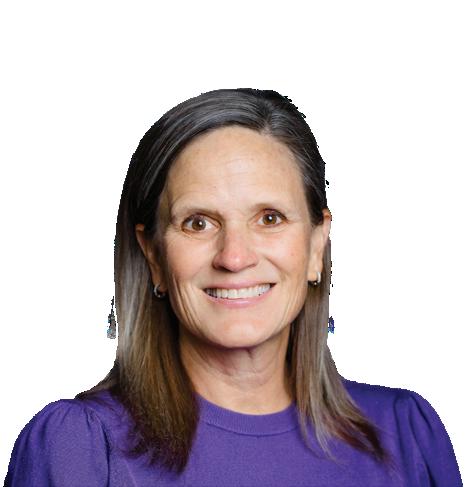
Julianne Sanders Schaaf ’81 First Grade Lead Teacher
At Trinity since 2012
Master of Science in Environmental Education
Antioch University
Bachelor of Arts in Anthropology and Sociology
Wesleyan University
@julabbie
@trinityacademiccamp
Q: What is your favorite memory from elementary school?
A: One of my favorite memories from elementary school, which was here at Trinity, was performing in The Mikado outside on the playground. Music class with Mrs. Vrieland was always fun, from singing holiday songs to learning opera to playing recorders.
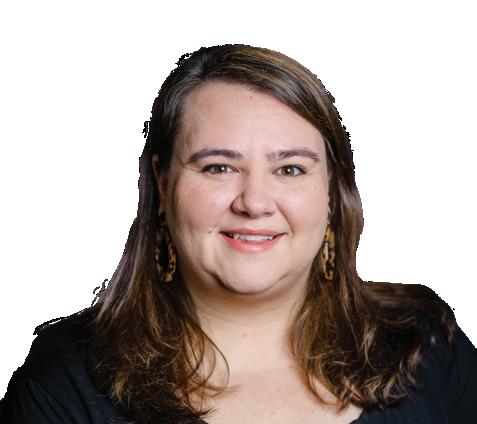
Stephanie Selman Associate Communications Manager
At Trinity since 2019
Bachelor of Science in Interdisciplinary Studies
Kennesaw State University
@trinityschool
/trinityatl
@trinityatl
Q: What is the number one item on your bucket list?
A: To go to Iceland and see the Northern Lights.
10



Embark on an unforgettable experience at Trinity School
Summer Camp!
Trinity School Summer Camp offers a variety of academic, specialty, and sports camps for children ages 4 to 13. From art to Legos, science to sports, choose your child’s summer adventure from our weekly camps that will run June 3–28* and July 29–August 2. They can join us in Before-Camp Care, Activities in the Afternoon, and After-Camp Care to extend their summer fun to a full day, from 7:30 AM–4 PM!
Register today at: www.trinityatl.org/summercamp
Contact Kayleen Whitmer, Director of Extended Programs, at kwhitmer@trinityatl.org for more information.
*Trinity School will be closed on June 19 in honor of Juneteenth; no camps will be offered on that day.

News

New endowment fund celebrates employees’ years of service
By Nicole Fash, Director of Marketing and Communications
During the January 2023 Board meeting, Trustees made the unanimous decision to transfer $2.5 million from the Board’s operational reserves to the School’s endowment. Demonstrating Trinity’s steadfast commitment to its faculty and staff, this generous allocation established The Faculty/ Staff Years of Service Fund, which will be maintained in perpetuity. The interest generated from the fund will provide the School an additional way to honor employees’ loyalty to Trinity by providing all full-time employees with an annual
bonus based on the length of their service.
“The Years of Service Fund embodies our deep gratitude for the dedication and passion each Trinity employee brings to their role every day,” says Head of School Joe Marshall. “As an employee’s years of service grows, so does the bonus, reflecting the depth of their commitment. With the establishment of this fund, the Board has not only provided tangible and sustainable support but also affirmed our collective belief in the importance of recognizing and celebrating the dedication of our faculty and staff.”
The structure of tenured bonuses will align with the years full-time employees have dedicated to Trinity. This year, employees with one to four years of service will receive one level of bonus, those with five to nine years another level, and those with 10 or more years the highest level. As of this school year, 37 percent of employees have been with Trinity for 10 years or more, representing a significant portion of long-term staff. Twenty-seven percent have been with the company for five to nine years, and 36 percent have tenure ranging from one to four years.
14
Trinity’s 146 full-time employees have amassed an impressive 1,214 years of dedicated service to our school.

15 years
Ken Bomar, Director of Finance
Robin Martin, Early Learners Lead Teacher
Sarah Mokotoff, Upper Elementary Learning Team Specialist
10 years
Thomas Benefield, Fifth Grade Associate Teacher
Charlotte Maguire, Early Learners Associate Teacher
Brooke Ovorus, Fourth and Sixth Grade Science Teacher
Matt Scott, Third Grade Lead Teacher
Seventeen employees reach milestone years
In addition to the newly established annual bonus, faculty and staff members reaching milestone years will receive special gifts, a tradition long upheld at Trinity. At the five-year mark, an employee receives a specially engraved letter opener. At 10 years, employees are given a beautifully engraved wooden box that matches the letter opener. On reaching 15 years of service and every fifth year thereafter, employees receive a monetary gift. We celebrate the individuals listed on this page who have reached significant milestone years of service at Trinity School this school year.
5 years
Andrea Barnett, Kindergarten Lead Teacher
Hunter Branch, Fourth Grade Lead Teacher
Melissa Cooney, First Grade Lead Teacher
Katie Hammett, Director of The Trinity Fund and Major Gifts
Jose Martinez, Facilities Lead
Allen Parrott, Maintenance Tech II
Stephanie Selman, Associate Communications Manager
Michelle Siegel, Assistant Director of Extended Programs
Claire Snyder, Second Grade Lead Teacher
Marley West, Kindergarten Lead Teacher
15
Robin Martin, Ken Bomar, and Sarah Mokotoff have reached 15 years of service at Trinity.
Faculty and Staff Milestones
Join us as we celebrate the personal milestones of Trinity School’s faculty and staff in this recurring feature.

At Trinity since 2018, Kindergarten Senior Associate Teacher Holly Brookshire and her husband, Corey Brookshire, welcomed their first child, Violet Elizabeth “Birdie” Brookshire, on August 8, 2023.
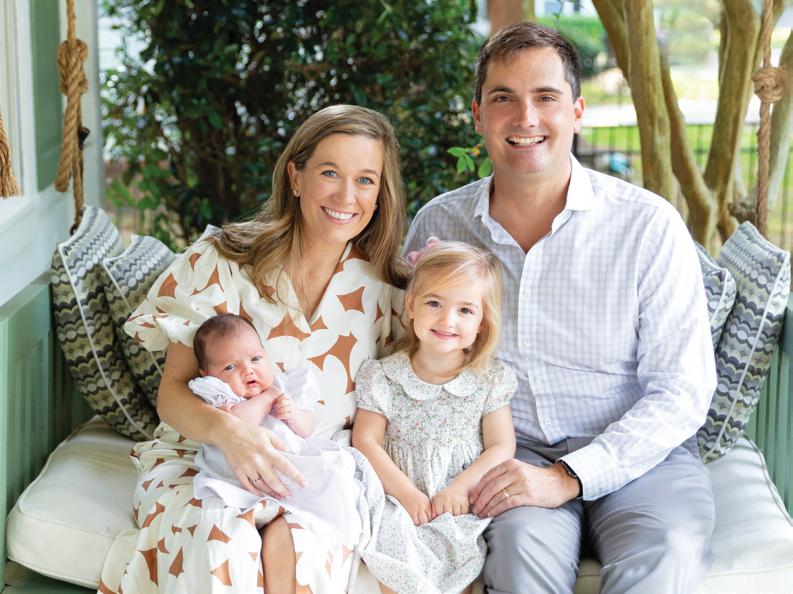
At Trinity since 2016, Admissions and Enrollment Management Associate Lauren Darden, and her husband, Tad Darden, welcomed Haisten Williams Darden on September 14, 2023. Haisten joined proud big sister Annie.
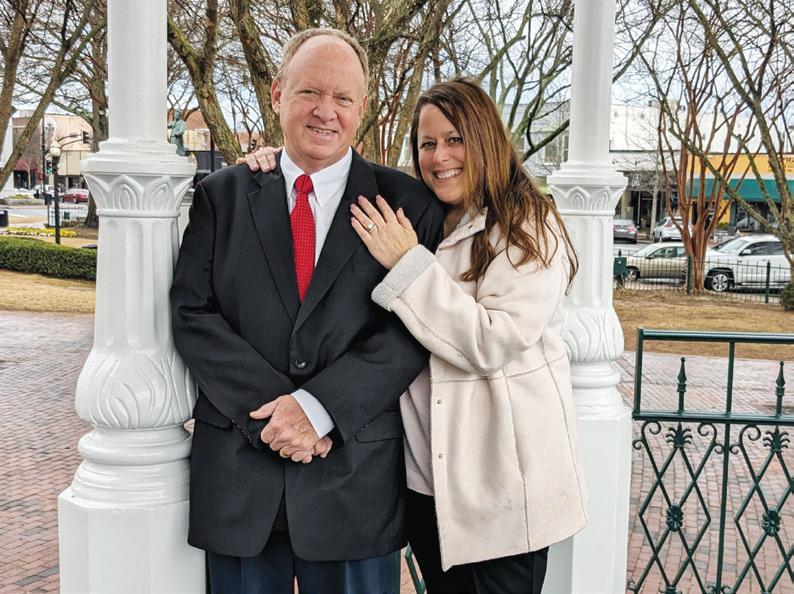
At Trinity since 2007, Upper Elementary Music Teacher
Alyssa Gangarosa married Paul Burton on January 7. The couple enjoyed an intimate ceremony with immediate family at Glover Park on the Marietta Square.
16
News
Highlights
Trinity Tidbits
By Nicole Fash, Director of Marketing and Communications


Trinity’s youngest learners donate 387 pajamas
For 12 consecutive years, Trinity’s Early Learners and Pre-K students have participated in the Warmth Project. During the month of December, students and their families donate pajamas to children in need, which is meaningful to these young students as they can understand warmth and safety and love from caregivers and that these circumstances are not always available to everyone. This service-learning initiative is in partnership with the Pajama Program, a national nonprofit dedicated to ensuring all children have access to healthy sleep. This school year, Trinity’s youngest two grade levels donated a combined total of 387 pajamas and celebrated with a pajama day on December 8, 2023. In addition, Scholastic Books donated a book for every pajama received.
17


Fifth Graders raise record-breaking $24,330.37 for life-saving filters
On November 29, 2023, Fifth Graders hosted their 10th annual Freshwater Fair, sharing what they have learned about freshwater ecosystems and making learning fun for all Trinity students. At the event, Fifth Graders operated creative games they constructed and offered impressive facts about animals from all over the world. All Trinity students and teachers were invited to attend, and there was a five-coin entry fee per person. This year’s fair brought in $1,052.57. Combined with the $23,277.80 raised during the Fifth Grade’s fifth annual freshwater walk-a-thon, our Fifth Graders raised a record-breaking $24,330.37 to purchase life-saving freshwater filters through Start With One Kenya and Uzima Clean Water Mission. These filters go to Njoro in Kenya, a region that has a high rate of water-borne disease. Each filter costs $40 and lasts for 10 years, and the money raised allowed Fifth Graders to provide 608 families with safe drinking water for the next decade.

Trinity’s commitment to addressing freshwater scarcity has also inspired individual fundraising endeavors. When Ellie was in Second Grade, her mother reached out to Fifth Grade Science Teacher Becky Maas to share Ellie’s initiative of making and selling mask lanyards for charity. After learning about Start with One from her Second-Grade teacher, Ellie was inspired to donate some of her earnings to purchase a water filter and wanted to know what one cost.
Moved by Ellie’s thoughtfulness, Becky not only responded to Ellie’s question but also asked to purchase a mask lanyard. The next thing Becky knew, Ellie gave her two crips $20 bills for the filter and a free lanyard in shades of green and blue reminiscent of water, which Becky used every day during the pandemic.
Fast forward three years, Ellie decided to further her charitable efforts beyond the Fifth Grade’s Freshwater Fair and walk-a-thon by selling Taylor Swift-inspired bead bracelets. These bracelets, made with fair trade beads from Kenya to support their economy, garnered enough sales to purchase six water filters.
“I love Ellie’s caring heart and initiative and think she’d be such a great example to our Trinity community,” says Becky.
When asked why supporting Start with One is so important to her, Ellie says, “I think it’s a very important cause because there are so many people without freshwater around the world, and I want to help as much as I can. And I want to do it in a way that I really enjoy, which is making jewelry.”
18
Highlights
Balloons Over Trinity parade showcases STEAM projects
For the fourth consecutive year, our Third Graders orchestrated their own Balloons Over Trinity parade. Held on the Trinity Track on November 16, 2023, students were inspired by the book Balloons Over Broadway: The True Story of the Puppeteer of Macy’s Parade to create balloon puppets with their peers for the parade, contributing to a unique Thanksgiving-themed STEAM project.

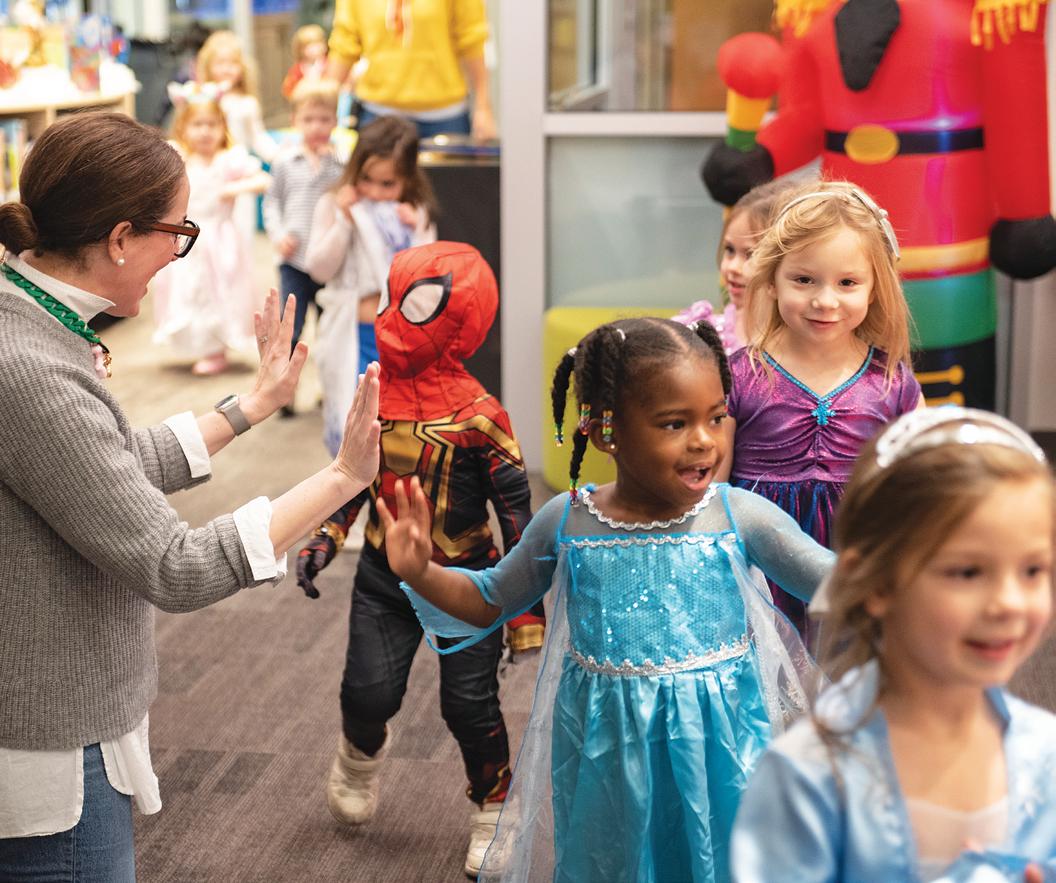
Disney characters go on parade
One of the most magical events of the school year, the Extended Programs’ annual Disney parade for the Early Learners who attend Lunch Bunch was held on December 1, 2023. Trinity’s youngest students dressed up as their favorite Disney characters and paraded around campus while members of the school community cheered them on.

19

Early Learners celebrate friendship at annual feast
Early Learners gathered for their annual Friendship Feast on November 16, 2023. They enjoyed singing together, exchanging friendship necklaces, and helping prepare then eating a delicious turkey lunch. There were full tummies and thankful hearts all around.
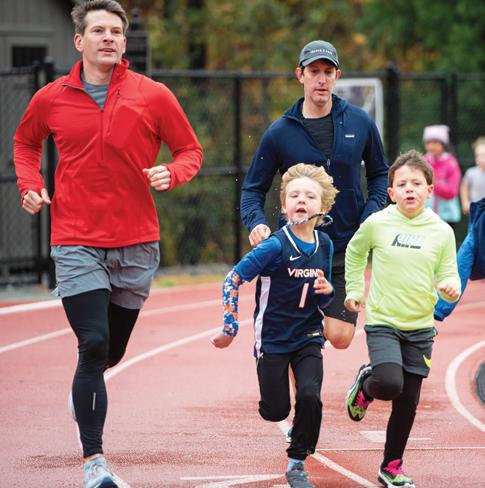
Rain doesn’t dampen spirits at annual Turkey Trot
Despite the rainy cold weather, Trinity School saw a great turnout for the Turkey Trot. Held on November 11, 2023, this event featured a one-mile course with refreshments at the end. All Trinity families were invited to participate in this annual Fun Run/Walk event.

October 20 was a very Grand Day
Trinity’s Grand Day event on October 20, 2023, brought smiles and cherished moments as students’ grandparents and special friends joined us on campus. The day featured warm welcome receptions, performances by Trinity’s Harmony Choir, classroom visits, and special activities, creating lasting memories for our students and their loved ones.

Second Graders experience
Native American culture at Stone Mountain Pow Wow
Second Graders had an unforgettable day at the Native American Festival and Pow Wow at Stone Mountain on November 2, 2023. They witnessed mesmerizing traditional dances that transported them to another time and learned about how hunting tools and shelters were made by Native American communities. Our young explorers soaked up knowledge and culture that kicked off their unit of study on Native Americans.
20 Highlights

Bella Giorno certified as Orton-Gillingham Associate
In November 2023, First Grade Senior Associate Teacher Bella Giorno was inducted as an Associate member of the Academy of Orton-Gillingham Practitioners and Educators. At Trinity since 2020, Bella completed her associate-level training after undergoing 10 observations and conducting 100 hours of small group and one-on-one instruction under the mentorship of Orton-Gillingham Fellow Josie Calamari.
She says, “As the First Grade Associate, my most important role involves pulling students who show initial signs of needing additional phonics and reading support from all four First-Grade classrooms. I previously completed the Classroom Educator training, but because I only work with small groups of two to three students, I knew my lessons needed to be more individualized and targeted. Therefore, I decided to pursue the Associate Practicum where an Orton-Gillingham fellow would guide me through my small group and one-onone instruction to best help me determine and address the needs of my students. I am grateful to work in a community where continued growth and professional development are encouraged.”
Bella has a Master of Science in Education in Literacy from the University of Pennsylvania and a bachelor’s degree in Elementary Education and Psychology from the University of Miami.

Rides and attractions abound at Trinity’s annual School Festival
Once again, all current families and employees were invited to take part in Trinity’s School Festival, which is an annual event hosted by the Trinity School Parents’ Association and run by parent volunteers. This year’s event, held on October 22, 2023, was a resounding success, with participants enjoying a myriad of rides and attractions scattered across the campus. From a zipline, rock wall, and obstacle course to face painting, a fake cast station, and classic carnival games, there was something for everyone.

Fourth Graders demonstrate gratitude toward veterans
In November 2023, Fourth Graders rallied behind 20 veterans residing at the Veterans Empowerment Organization (VEO) in Atlanta. Through a 10-day campaign, these students, alongside their families, gathered essential supplies including toiletries, hooded sweatshirts, pants, toboggan beanies, and winter coats. Additionally, they penned heartfelt letters of gratitude to the veterans, personally delivering them alongside the donated goods and sweet treats to the VEO on Veterans Day.
21
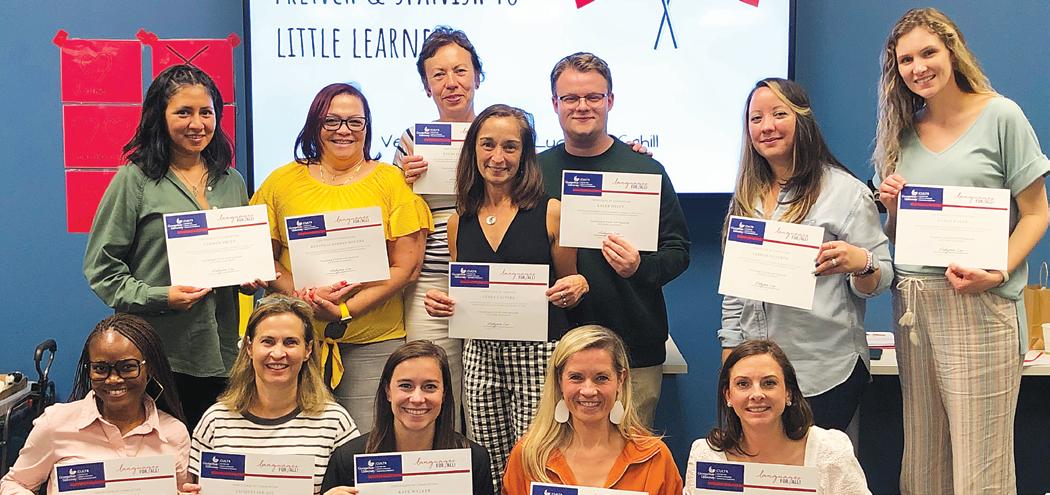
Early Elementary World Language Teachers lead workshop at GSU
Early Elementary Spanish Teacher Lucretia Cahill, who has been at Trinity since 2020, and Early Elementary French Teacher Vesna Galtere, who has been at Trinity since 2018, presented “Teaching French and Spanish to Little Learners” during Georgia State University’s Teacher Workshop held on October 27, 2023. With a combined teaching experience of almost 45 years, Lucretia and Vesna shared best practices and strategies with teachers and parents who teach second languages to young children. The workshop was organized by GSU’s Center for Urban Language Teaching and Research (CULTR), which is the first Title VI Language Resource Center in the Southeastern United States.
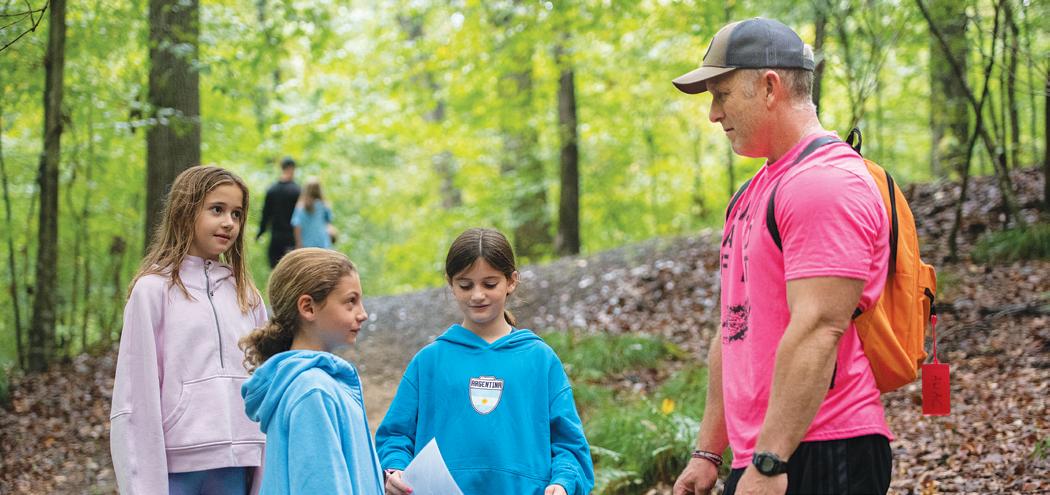
Trinity hosts second Trail Day
On October 14, 2023, Trinity held Trail Day, the second event of its kind since the inaugural one in the spring of 2019. More than 300 students, their families, and school employees dropped by between 8 and 10 AM to explore the three miles of trails that meander through Trinity’s Discovery Woods. After conquering hills, winding paths, and stream crossings, participants were rewarded with doughnuts, coffee, and Trinity Trails stickers. The School’s second Trail Day was a resounding success, offering families a fun and engaging way to connect with nature and make lasting memories on Trinity’s campus. A special thank you to Coach Jedd Austin, who has been with Trinity since 2006 and has passionately dedicated the last several years to clearing, maintaining, color-coding, and mapping dozens of trails from what was once a single loop.

Jill Gough leads professional development in DC and Texas
On October 27, 2023, Director of Teaching and Learning Jill Gough, who has been at Trinity since 2012, was a presenter at the National Council of Teachers of Mathematics (NCTM) Annual Meeting & Exposition in Washington, DC. During her 60-minute session, titled “Leading Learners to Level Up: Empowering Students to Deepen Understanding of Mathematical Practices,” Jill discussed the importance of empowering students to become self-correcting and independent learners by making thinking visible, offering feedback, and showing students their growth over time. She also offered teaching strategies to support students in embracing mathematical practice standards.
In addition, on October 16, 2023, Jill co-led a full day of professional learning with Rankin County School District Teacher and Curriculum Specialist
Jennifer Wilson at the Texas Association of Supervisors of Mathematics fall conference in Austin, Texas. The goal of their workshop was to equip educators with strategies to set clear mathematics goals, support all students in their learning journey, and promote self-reliance and independence in mathematical problem-solving. It emphasized the use of leveled learning progressions and a slow and deliberate approach to mathematics education to achieve these goals.
22 Highlights
Trinity Traditions
Trinity School’s rich history began in 1951. While the campus has moved twice since its founding and the School’s programming is continually enhanced, Trinity also maintains numerous grade-level, division-wide, and school-wide traditions that reinforce the School’s identity, curriculum, and values. This section is dedicated to highlighting some of the many special events that our students look forward to every year.
Sixth Graders’ First Day Caravan
The first day of school is important for all students, but there is something extra special about the Sixth Graders’ carpool caravan.
Catching the Gingerbread Man
At the beginning of the school year, Pre-K students once again found the runaway Gingerbread Man while becoming acquainted with all the faces and places at Trinity. Staff and faculty from all over the campus provided students with clues to find the elusive Gingerbread Man.
Nursery Rhyme Parade
In September, Pre-K students dressed up as their favorite characters, paraded through the hallways, then recited nursery rhymes in the Allison Williams Activity Center during the annual Nursery Rhyme Parade.
Early Learners Treasure Hunt
In late September, Early Learners wrapped up Pirates Week and their Shapes unit of study with a real-life treasure hunt!
Halloween Parade
Early Elementary Division students and faculty donned fantastic costumes and put the Trinity community in the Halloween mood by throwing the annual Halloween Parade.
Patriotic Performance
During the Fourth Grade’s annual Patriotic Performance, our Fourth Graders celebrated patriotism and Veterans Day by singing songs and honoring our community’s veterans and military service members during a very special all-school assembly.
The Nutcracker
Put on every year by Fifth Graders, the much-anticipated The Nutcracker was set to Tchaikovsky’s classic score and included dancing, elaborate costumes and set design, and epic battles. This year’s Fifth Graders put on two performances.
Thanksgiving Program
All students and teachers came together and celebrated the Thanksgiving season with musical performances during a special all-school assembly.
Native American Trade Day
Each year, Second Graders culminate their Native American unit with Trade Day. Over a few-week period in November, each Second-Grade class learned about a different Native American tribe. They then led a special Trinity Together Time, sharing their knowledge with the rest of the student body. Afterwards, the Second Graders came together and traded resources while representing the various tribes.
Holiday Program
The Upper Elementary Division students put everyone in the holiday spirit by presenting a special musical performance of Christmas and Hanukkah songs at Trinity Presbyterian Church.

24
Highlights



5 8 9 Highlights 26


11 Highlights 14

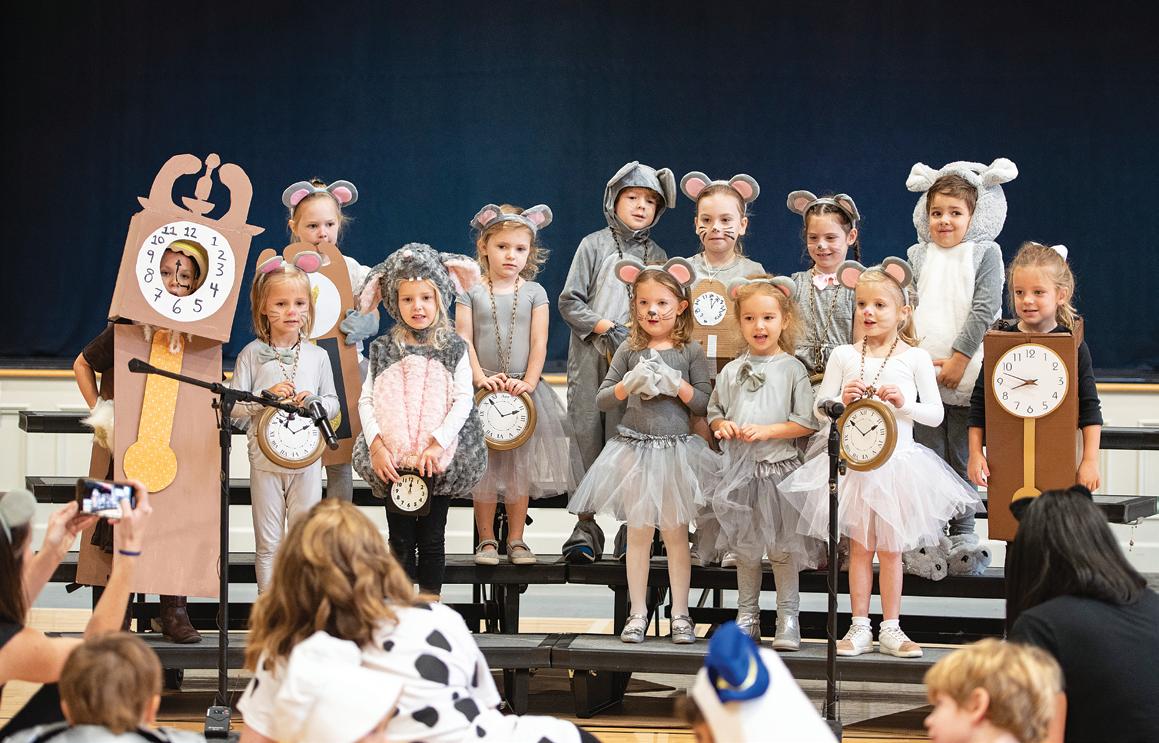
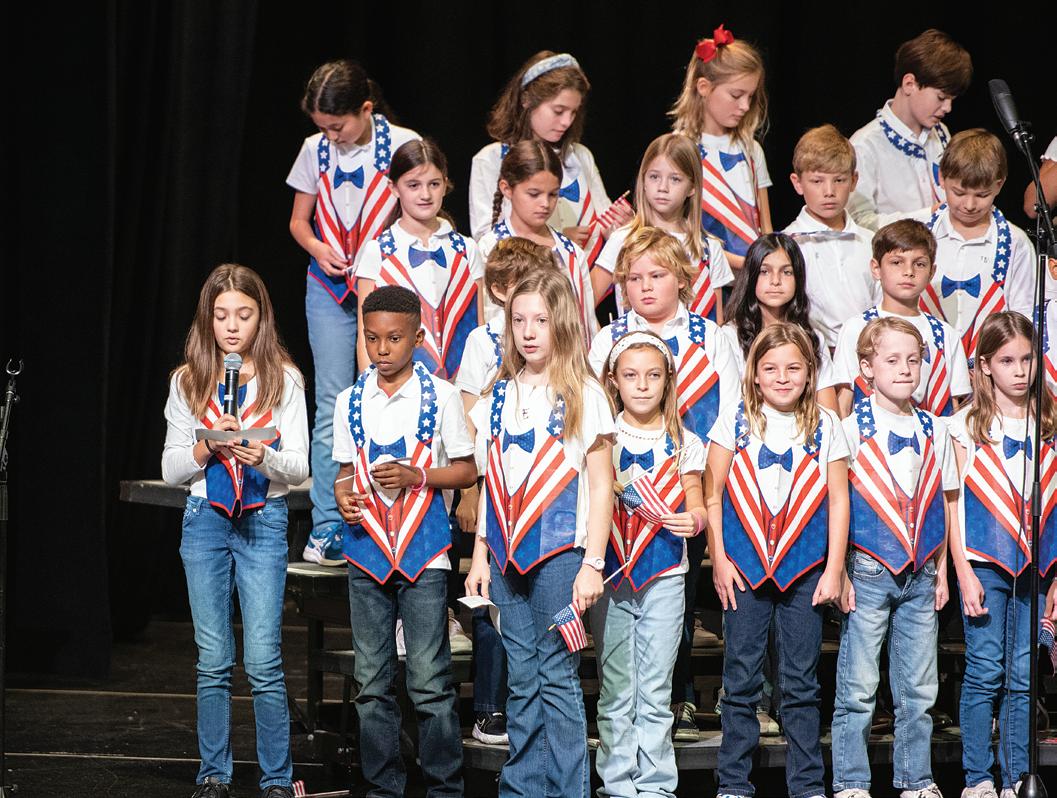
29 12 13 11. Catching the Gingerbread Man 12. Halloween Parade 13. Nursery Rhyme Parade 14. Nursery Rhyme Parade 15. Patriotic Performance 15
Features

30
Sixth Grader Clara and other members of the advanced string ensemble help welcome guests during a fall admissions Open House.
Preparing tomorrow's leaders: Trinity's approach to digital citizenship
By Val Boone, Instructional Technology Lead

32 Features
Val checks in on Fourth Graders Jax and Logan as they code using the Scratch programming language.
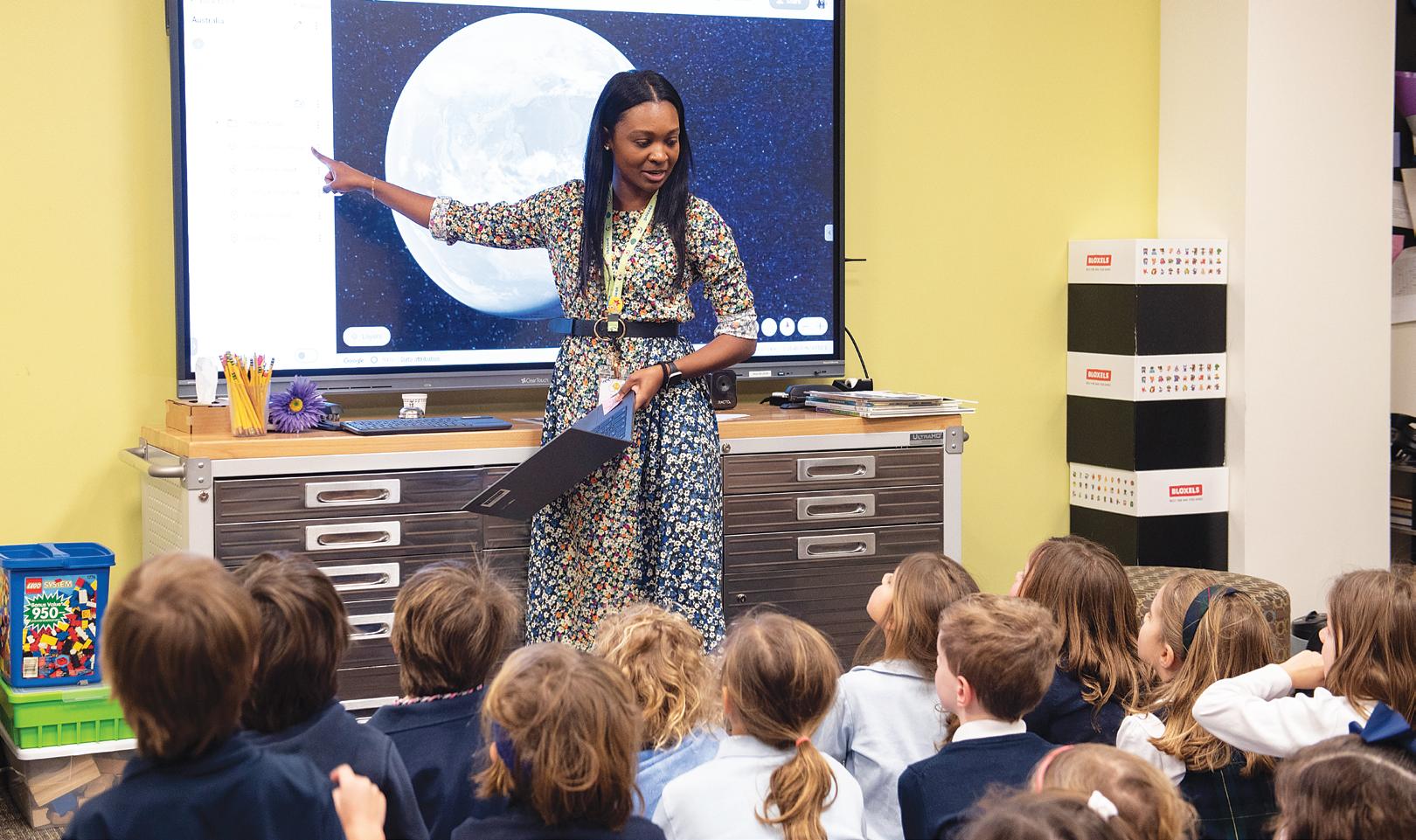
Digital citizenship is not just a buzzword. It is a comprehensive skillset and behavior crucial for navigating our constantly changing digital world. It incorporates the ability to use technology safely, responsibly, and respectfully, creating a positive digital footprint.
As Third Grader Peyton says, “Digital citizenship is good for everyone because you can be safe and still have fun. You can be kind online.”
The goal of digital citizenship education at Trinity is to equip learners with the essential skills to not only navigate the digital realm ethically and responsibly but also be the future leaders of tomorrow.
As Trinity’s Instructional Technology Lead, teaching online safety and digital citizenship allows me to see our school mission and pillars in action every day. Our students thrive on play-based and experiential learning. Through ageappropriate games, interactive activities, and projects, our students learn the importance of responsible technology use while cherishing the joy of childhood. For example, Third Graders enjoy playing Interland, an online adventure game that teaches students key lessons in Internet safety through four fun challenges. Second Graders play Cloud
Chaos, an interactive safety adventure game that also integrates coding concepts.
And in today’s world, the teaching of online safety couldn’t be more important. As Third Grader Rose points out, she uses her computer in math, music, completing projects in SeeSaw, and even during ERB testing.
Third Grader Amelia says, “In the Idea Lab, we work on typing and copying (and pasting) and how to use the computer. We use the computer in every class but P.E.”
Deepening learning experiences through critical thinking and collaboration are essential skills for creating leaders in digital spaces. By allowing students to explore ageappropriate online spaces, we can engage in valuable discussions, evaluate sources critically, and develop their ability to think ethically and responsibly in the digital world. One of my favorite lessons to teach is one I created with Makerspace Specialist Paul Pileggi called “Triggered.” In this lesson, Fourth Graders are challenged to navigate their emotions while looking at a variety of fake websites. We discuss the content, how to search for information that confirms a news source, and why we would or would not share the information.
33
Val shows Kindergartners how to use Google Earth.
“I think it’s frustrating to know that people put content into the world that’s not designed to inform but cause a reaction,” says Paul. “It’s important to practice doing these things so students are better prepared in the future.”
Another lesson I teach Fourth Graders revolves around confirming news headlines. I give students a variety of fake and real news stories, and while working under multiple layers of security, including SafeSearch, they use Google to search for additional information that confirms or denies the headline. Students must question and think critically about the content that floods their search, and we discuss ways to navigate the results. Fifth Grader Aarya says the “Triggered” lesson she did as a Fourth Grader helped her determine which websites were scams and where she could source reliable information.
Learning online safety skills gives students a growth mindset by encouraging them to view challenges as opportunities for learning. We are entering a new age of technology in which artificial intelligence and cybersecurity must be addressed when discussing digital citizenship and media literacy at school and at home. Students must make choices that will be reflected in their digital footprint, the trail of data left behind by a person’s online activity, and they must be resilient and adapt to the evolving challenges of the internet. Sixth Graders experienced this first hand when exploring machine learning—a field of AI in which a computer is taught to recognize patterns and make decisions—as they collected data to train a computer to recognize certain images.
Sixth Grader John says, “I thought it was cool that a computer could learn so much from just one picture.” Our students continuously exhibit curiosity, creativity, and confidence in our ever-changing digital world. It’s truly amazing to witness this from our youngest students. Often, Early Learners will stop by my room in the morning to ask about robots, or Kindergartners will ask about what their older siblings are doing. By the time students are in Fourth, Fifth, and Sixth Grade, I’ve noticed that most already have specific interests such as digital art, gaming, or even keyboarding. A good amount of our students enjoy digital design, and I’ve also asked students to design digital posters and presentations that showcase the do’s and don’ts of online behavior.
Additionally, I encourage students to talk to each other about what they are working on, and help each other, whether they are in Kindergarten or Fifth Grade. One of the Extended Program classes I teach, Minecraft Architecture, is purely collaborative as students work
together on different projects throughout the semester. In MiTech, Trinity’s teaching partnership between Media and Technology, we’ve completed a lot of projects in which students will design something on their computers such as soap labels or Olympic medals, then see their work in physical form using the 3-D printer. It’s always amazing to see their faces when they receive a finished project.
Technology concepts integrate beautifully with an array of skills and topics in the base classrooms, building an academic foundation that provides essential knowledge and skills our students will use for the rest of their lives. Research skills, critical evaluation of online sources, debates about AI and screentime, and even coding contribute to a well-rounded education. As students progress through their academic careers, these skills become valuable assets in literacy, mathematical problemsolving, and even physical education.
There is plenty that parents can do to reinforce digital citizenship at home. For one, parents can model positive behavior and set clear expectations. Parents should establish digital boundaries, encourage students to take breaks, show kindness online, and clarify when and where technology can be used. We should always promote kindness in offline as well as online spaces. I also encourage parents to stay involved, promote appropriate technology use, and talk to their children about how they can use technology and what interests them. Students can practice skills such as typing, creating slideshows, and coding at home. One of the most important things parents can do is to introduce technology gradually. Most apps and websites have parental controls so that you can slowly give your child access to certain features.
This past summer, I read the book Digital for Good: Raising Kids to Thrive in an Online World by Richard Culatta. It is very rare to find literature that is pro-screen time nowadays, and I was able to walk away with an interesting perspective. Kids deserve a better digital future, and it is up to the adults in their lives to help them create it. We constantly worry about overexposure to video games and screen time, but are we teaching them enough digital well-being skills?
The development of digital citizenship skills in elementary students is not only a response to the challenges but also a proactive approach to shaping responsible, ethical, and empowered future leaders. At Trinity, with the lessons they learn at school and home, our students can thrive in the digital frontier, equipped to navigate, innovate, and lead responsibly.
34 Features
Together, we learned how to leverage reasoning routines and crucial support strategies to help all students develop as mathematical thinkers. Instructional routines are specific and repeatable designs for learning that support both the teacher and students in the classroom. Each routine provides a familiar, accessible structure that supports repeated use until applying the necessary reasoning skills and asking questions becomes automatic — enabling all students to engage more fully in learning opportunities while building crucial mathematical thinking habits.
Kindergarten Lead Teacher Jessica Lyles says, “The workshop with Amy and Grace was fascinating. It required us as teachers to think deeply about our mathematical instruction practices and how they can impact our students. The workshop gave us multiple metacognitionbased strategies that allow us to better meet the needs of our students on their mathematical journey. It was very encouraging to wrap up knowing I had tools to teach my kids that they can use throughout their education.”
Leveraging reasoning routines to teach all students to think and reason mathematically demands that we learn more. Through the workshop, our teachers received affirmation and a deeper understanding of two routines that have changed their teaching practices.
One of these is the Three Reads protocol, which offers students a tool to enter a mathematical task, usually a word problem, and sustain their thinking throughout the task. Often, students either freeze or jump in too fast. Taking time to read for understanding is a mindful approach to learning. Students are asked to read the math problem three times to discern its context, quantify it, and create a plan to solve it. Sensemaking is the first of the Standards for Mathematical Practice and our goal for every student. We must make sense of the task before we persevere to solve it.
Upper Elementary Learning Team Specialist Mary Jacob Harris says, "We are so grateful that this class validated the importance of the explicitly directed Three Reads process of reading a math word problem more than once to determine meaning, quantity, and relationships. This strategy is important for all students and particularly transformative for students with learning differences."
First Grade Lead Teacher Julianne Sanders Schaaf ’81 says, “I especially liked the Three Reads Routine: learning to read like a mathematician. Teaching this routine explicitly and reinforcing it consistently has given our students confidence in their abilities to make sense of problems.”

36
Features
Amy Lucenta leads a discussion with Trinity Teachers and guests around classroom routines that highlight student strengths as well as differentiate to serve diverse learning needs.
Fifth Grade Math Teachers Vicki Eyles and Laura McRae say, “We have been implementing the Three Reads method for tackling word problems. We encourage our students to ask themselves: ‘What is the word problem about? What is the question? What is the important information?’ This structure provides just enough support for students to feel confident while independently solving challenging word problems.”
Another routine, the Four Rs Protocol (repeat, rephrase, reword, record) coaches teachers to listen more and talk/ write less. When a student answers in class, we should ask another student to repeat, rephrase, or reword their classmate’s response. This offers more student voice in the classroom and opportunities to learn from peers. Asking for a repeat or rephrase gives more time for thinking and understanding for both the student and the teacher. It accommodates students who grapple with receptive and expressive language and with attention. More importantly, student thinking is highlighted and attention is drawn to sense-making and sustained thinking.
Sixth Grade Math Teacher Kristi Story says, “What I loved about the workshop with Grace and Amy was the routines were clearly explained, instantly applicable, and incredibly useful. After this workshop, I have included the Four Rs, Three Reads, and so much more in my instruction with Sixth Graders. I am so grateful to be at Trinity, which provides these opportunities that help me grow as a teacher.”
We know that these reasoning routines are essential for all students and that using them differentiates instruction naturally by working upstream to add thinktime and instructional support in whole-group instruction proactively. They are especially beneficial in supporting students with learning differences and highlighting their mathematical strengths.
Learning Team Specialist Sarah Mokotoff says, “I appreciated learning about the importance of having every student in class have the opportunity to develop language and math thinking and that everyone has the opportunity to speak. I have used the Four Rs routine to support students who struggle with receptive and expressive language and/ or word recall.”
Teachers as learners are the cornerstone of a successful school. Working in the instructional core compels teachers to learn more about their students and learn more about the content of their courses. On the surface, it looks easy and repetitive, but when we dive deeply into pedagogical practices, there is always more to learn.
Vicki Eyles and Laura McRae say, “We enjoyed the opportunity to learn together and work with other colleagues across grade levels. This allowed us to see how the work done from grade level to grade level builds to create a strong academic foundation.”
Learning Team Specialist Samantha Steinberg sums it up best, “The professional development with Grace and Amy reinforced the importance of providing structured routines for our students. These routines help to develop their mathematical thinking and give them a routine that they can go back to again and again. This shifts students’ mindsets from ‘What did you get?’ to ‘How did you do it?’ We always want students to be focused on the process so they can figure out which strategies are successful for them.”
37
Marsha Harris facilitates a discussion on interactive writing routines for teachers to elaborate, connect, and expand their teaching tool kits.

Trinity’s journey to unlocking students’ writing potential
By Marsha Harris, Director of Curriculum
Do you remember when you learned how to write? I often ask teachers and parents this question to reflect on their experience as a young learner. Some people have vivid memories of this, while others have none. I distinctly remember sitting at my grandmother’s telephone table, looking through her address book and mimicking her beautiful cursive writing. I would take out pieces of paper and scribble long lines that were a representation of handwriting. They didn’t mean or say anything; it was more about the artistic visual. It wasn’t until many years later that I had vivid memories of writing stories and putting my imagination into words and illustrations on paper. But it wasn’t always easy. I often stared at a blank page, frustrated and lost, terrified to share my thoughts.
38 Features

Over the last several years, Trinity Teachers have been deeply engaged in understanding the Science of Reading, so we are using evidence-based research from the last five decades to explicitly teach the essential skills that develop adept readers. Key neuroscience discoveries inform us how the brain responds to language and print, and when we strengthen foundational reading skills, we unlock the potential to become better writers. Repeated reading allows students to develop automaticity and fluency, freeing up their cognitive load so that they can not only comprehend more but also more easily express themselves and write creatively. Our commitment to being leaders in elementary education and staying at the forefront of academic advancements led us to embrace the Science of Reading earlier than most, and we are now deeply entrenched in the best way to explicitly teach writing.
In The Writing Rope: A Framework for Explicit Writing Instruction in All Subjects, author Joan Sedita says, “Writing, like reading, is a relatively new cultural development. It does not come naturally the way speaking does, and it is a demanding and highly complex process. Becoming a skilled writer begins with the acquisition of foundational skills such as spelling, handwriting, and sentence writing.”
The Writing Rope is a roadmap and explicit guide to various skills, such as critical thinking to generate ideas; understanding syntax and how to write sophisticated, elaborated sentences; applying text structure; knowing the task, audience, and purpose for writing; and finally, spelling and transcribing by hand or on a computer.
To best serve our students, we must know the characteristics and phases of development. In Patterns of Wonder, authors Jeff Anderson and Whitney La Rocca describe the phases of writing development as “characteristics or writing behaviors that help us understand our emergent writers better.” In this book, they describe the four phases that encompass the writing development for all students at Trinity School, from Early Learners through Sixth Grade.
During Pre-Planning in August, teachers across divisions explored the components for explicit writing instruction. Early Learner and Pre-K teachers identified the four phases and characteristics of writers. With each writing phase, we develop oral language and retelling and focus on vocabulary development to express our ideas. Knowing where students are in the process of writing helps teachers intentionally guide them toward the next phase.
39
Third Grade Teacher Matt Scott, Kindergarten Teacher Marley West, and Second Grade Teacher Katherine Goldberg collaborate to align writing routines across grade levels while they hone their instruction.
• Scribble Writing represents language by using a variety of lines and dots, relying heavily on oral language and drawing to convey meaning.
• Symbol and Letter Writing involves creating drawings that represent words and experimenting with letter and sound correspondences. Students attempt to label their drawings with letters and try to make strings of letters that represent language.
• Transitional Writing is when students begin to label their drawings with words using letter sounds to spell or copy words from around the classroom. Students also start to use spaces as word boundaries in sentences while practicing capitalization and punctuation.
• Conventional Writing emerges when students spell familiar words and intentionally use spaces, capitalization, and punctuation to craft sentences.
Writing is complex, and students must develop foundational writing skills like reading. Teachers must explicitly teach and facilitate emerging writers, integrating various skills, strategies, and techniques to craft and communicate. Teachers model shared writing through morning messages, mentor sentences, and exposing students to read-alouds with rich vocabulary. This leads to intentionally designed conversations about words and their meaning. When students read, they practice stopping and making notes of the author’s craft, structure, and word choice. They begin to compare and contrast, recognize when authors repeatedly mention ideas as they engage in the text as readers, then apply these techniques in their own writing.
In addition to participating in the professional development focused on writing during Pre-Planning, around 25 base classroom and specials teachers from both the Early Elementary and Upper Elementary Divisions participated in The Writing Revolution book study this school year. The book introduces the "Hochman Method," which is a scope and sequence of sentence-level routines that encourage the development of elaboration skills.
According to the author, Judith Hochman, “Even writing a single sentence can be challenging for students, especially when it involves explaining, paraphrasing, or summarizing sophisticated content.”
The teachers learned that students require explicit writing instruction from a very early age, as sentences are the foundation of all writing. When embedded in the curriculum, writing instruction becomes a powerful tool for improving comprehension. They also learned that grammar is best taught in the context of student writing, and that planning and revising are the two most crucial parts of the writing process.
The outcome of this book study was that teachers began to question and revise their scope and sequence of instruction so that sentence elaboration routines took place at the beginning of the year. Each group of teachers recognized the importance of school-wide routines introduced in Kindergarten that can be expanded upon through the Upper Elementary years.
“The Writing Revolution is an excellent resource for strengthening our students’ writing,” says Instructional Literacy Specialist Jayna Cook. “It also provides a robust framework teachers can use in their writing instruction. The tool gives students a framework for elaborating sentences, and the routines are clear, straightforward, and easy to implement and understand. I have observed teachers throughout the building implementing sentence elaboration strategies from The Writing Revolution in classrooms. Using the method outlined in The Writing Revolution, students add more details and make their sentences more complex and exciting!”
According to Upper Elementary Learning Team members, “Reading and writing are reciprocal processes. Using sentence expansion with our students helps check for understanding and provides a structure for sentence formation. As a result of using this routine, they can write more complex sentences and express their thinking more clearly in writing.”
“Week after week, The Writing Revolution professional development gave me new ideas to implement into our curriculum,” says First Grade Lead Teacher Rebecca Stewart. “In First Grade, we found our greatest success with sentence expansion. We started with a ‘kernel.’ Then, students could create more elaborate sentences using question words as their guide. We found this helpful as a reading response and in weekly routines such as Newsbook. We look forward to continuing this practice throughout our First Grade Zoo research project.”
At Trinity, we are committed to empowering our students with the essential communication skills, both written and oral, that they need to excel in middle school and beyond. We understand that building a solid foundation of knowledge and skills is crucial to their success, and we believe in providing a safe and supportive environment where they can grow and thrive. Developmentally appropriate routines are designed to meet the unique needs of each student, helping them gain the confidence they need to stand out and be recognized for their talents. We are here to support and guide them every step of the way as readers, writers, mathematicians, and learners.
40
Features
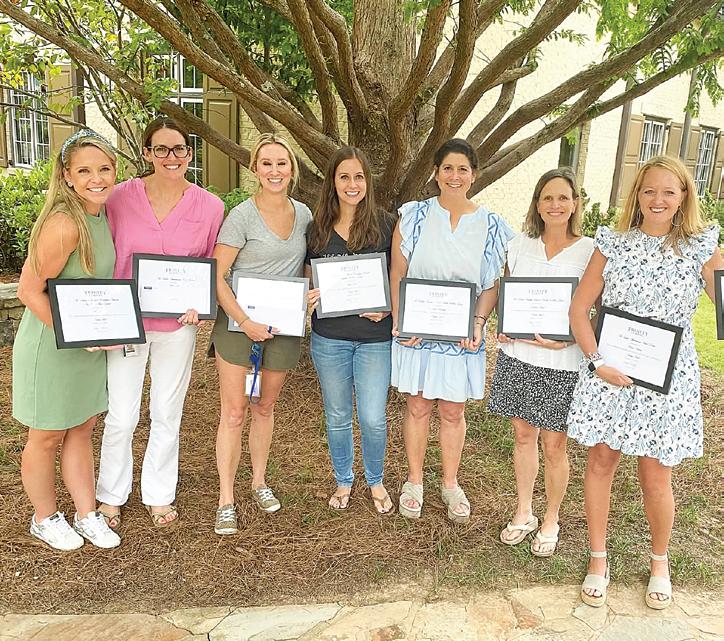
First-Grade teaching team embarks on the trip of a lifetime

Join the First-Grade team as they travel across the ocean and discover new teaching strategies and grow even closer during the trip of a lifetime. Their 10-day journey—from June 20–30, 2023—was generously funded through The Childress Family Fund for Faculty Excellence and the Teacher Opportunity Fund, two of Trinity’s endowed funds in support of faculty.
41
By First Grade Teachers Margaret Abernathy, Melissa Cooney, Hilary Daigre, Bella Giorno, Annie Jacobs, Abbie Shaw, Julianne Sanders Schaaf ’81, and Rebecca Stewart
Back view of the Shotover Estate, where the First-Grade team resided for several days.
First Grade teachers hold their grant awards in 2022.

A little background
Rebecca: In the summer of 2008, my sister-in-law, Camilla Stanier, her husband, Alex, and their twins, Ellie and Fleur, moved into Shotover House. It was built in the early 1700s and the core of an inherited estate comprising 1,800 acres of Oxfordshire countryside. With an unparalleled history, Shotover’s rooms were filled with royal and military artifacts, artwork, documents, and much more.
Alex: Living in Shotover House isn’t like living in a normal house. It’s like living in a museum. When we took Shotover on, it was stuffed to the gunwales with centuries of history. We had no idea what we were facing, and 15 years later, some of the rooms still lie largely untouched.
Rebecca: Two of these rooms are in the basement, which is damp, and the contents are at risk. It has long been Alex and Camilla’s wish to create an archive space for the house, where valuable and historical documents can be stored and secured for future generations.
Julianne: On Rebecca’s many visits to her family’s fabulous estate, she developed an appreciation for the enormity of the job facing Alex and Camilla as they took on the management of the house and its grounds, an endeavor for which Queen Elizabeth herself had wished them the best of luck upon hearing news of their inheritance. Luckily for the Staniers, Rebecca, blessed with a penchant for problem-solving and a passion for helping others, started to formulate a plan that would capitalize on the strengths of her friends back home and provide an important service for her in-laws. “Why not,” she thought, “recruit the Trinity First-Grade team to help sort through the chaos of books, periodicals, and mail long neglected in the Shotover basement?” And thus, the great Trinity-Shotover pilgrimage was born.
Rebecca: With our extensive background in organization, our aim was to help them set up the archive and carefully sort through the contents of these two rooms. Whilst sorting, we also hoped to identify a selection of documents and artifacts that could be scanned and shared with the broader Trinity community as many of them are from worldwide events, such as D-Day. So, in the spring of 2022, the First-Grade team submitted a three-part grant proposal incorporating school observations, voluntourism, and team building to Trinity School. The grant would take us to England, where we would stay at Shotover before going to London.
In August 2022, our dreams became a reality when we were all awarded professional development grants. We spent the next 10 months preparing for the trip of a lifetime. We also delivered the news to many family members and friends, some of whom were former Trinity Teachers, including Ali Avery, Claire Paul, and Caroline Duggan. Interested in traveling abroad, intrigued by the voluntourism at Shotover, and eager to bond with former colleagues, these women
jumped on board! Claire, who had been awarded a grant from Trinity to observe a British school before the pandemic, was finally able to use the funds towards this trip. Caroline and Ali self-funded their portion of the trip. The addition of these women was amazing and made our trip that much more memorable.
Melissa: Being new to the First-Grade team and having to apply for a grant when I had just been hired was the perfect way to be welcomed! The team embraced me with open arms, and we immediately got to planning, which is when you really get to know people. We spent months working together and getting to know each other on another level to plan the perfect trip abroad.
Julianne: During the spring of 2023, in preparation for our visit, Rebecca moved over 250 paintings out of the room she and Alex decided would become the new archive room.
Rebecca: On June 20, 2023, we left Atlanta on four different planes but arrived at London Heathrow Airport more excited than ever, not even knowing the magic that lay ahead. This is our story.
We arrived as guests
Abbie: Staying at Shotover Estate was an incredible experience. Everywhere you turned in this historic home there was a story waiting to be told. Walking up the main staircase, we were able to see many paintings of notable people who previously lived there. They included Alex’s great uncle, Sir John Miller, who ran the estate before Alex and was also the Crown Equerry to the Queen for 26 years.
Julianne: Margaret and I shared the luxurious green corner bedroom that had a spectacular view of the lagoon and eyecatcher in the distance. The comfortable bed had a lavish carved wood headboard with golden green drapes that matched the bedspread and a crest of the Royal Scots Greys. On our side table was a bottle of Shotover spring water and across the room was a silver tray with a decanter of Shotover sloe gin and two crystal glasses. The best part of all was that we were welcomed with a simple bouquet of fresh flowers Camilla had gathered from the garden. The bedroom was fit for a queen, and that is exactly how we felt the moment we walked in.
Annie: Hilary and I stayed in a twin room in the South Wing with gorgeous views of both the eyecatcher and Queen Elizabeth’s obelisk. We had no shower, but a beautiful sixfoot pedestal bathtub that I enjoyed before bed every night. The best part about this room was that David Beckham had had a photoshoot there!
Abbie: I was so excited to have the opportunity to stay in the pink room during our visit. Walking into this room was like stepping back in time with all of the pink décor and antique furnishings, but my favorite part of the room was the window seat that I sat in daily. It was a corner room on
42 Features

the second floor that had the most gorgeous views of the eyecatcher and the rose garden.
Julianne: Alex treated us to tours of the Shotover grounds, which extended as far on the front side of the house as they did on the back. Behind the house, we made our way along the canal on a path lined by rows of poplars. Our destination was the stunning eyecatcher, a Gothic revival structure designed to balance the property and be a focal point visible from our bedroom windows. In front of the house was a gravel path leading to an obelisk erected to honor a visit from Queen Elizabeth. We made our way to the Octagonal Temple and through the millennial garden to the octagonal pond on the far end of the property. Among all of the incredible diversity of trees we passed on our daily walks, 205 notable species according to a recent survey, Alex pointed out what he considers the star of the show. It was an oak tree that dated back to 1457, meaning this roughly 567-year-old tree was planted around the time of the War of the Roses!
Abbie: One night during our stay, Alex brought out Sir John’s bearskin hat, and we had the opportunity to wear it along with his coat. It was surprising how heavy it was, and I can only imagine how hard it would be parading around in that for different British ceremonies.
Annie: Each night was devoted to bonding with each other and our hosts. When we weren’t singing Taylor Swift songs, the Staniers introduced us to traditional British games such as “Ibble Dibble” and “Empire” in the formal dining room of the estate.
Julianne: Because Alex and Camilla didn’t feel like entertaining our group of 11 at Shotover was enough to keep them busy, they decided to host a cocktail party one night so that we could meet a group of traveling artists attending a retreat at Alex’s sister’s house not far away. Glasses of rosé and trays of appetizers circled us as the guests marveled at the grand foyer of Shotover and followed us into the tapestry room. We had a wonderful time sharing stories of home and our adventures abroad with fellow American travelers.
Abbie: On our final night of staying in this historic home, we celebrated our hard work with what we referred to as our “Downton Dinner.” We donned fancy dresses, fascinators, and tiaras, then made our way to the extravagant dining room. I know this dining room has hosted many dinner parties over the centuries, but I’m not sure if the other dinner parties were as fun as ours!
We were team building as sorters, organizers, and archivists
Julianne: By the time we arrived at Shotover, the path was cleared for us to sort all of the artifacts into three categories: treasure, donation, or trash. All of Uncle John’s copies of Horse and Hound, a weekly periodical that he had collected for over 60 years, were handily bound, shelved, and labeled.



43
Alex and Camilla Stanier, residents of the Shotover Estate.
The team poses with Alex in the newly created archive room.
First Grade Teacher Abbie Shaw tries on Sir John Miller’s bearskin.


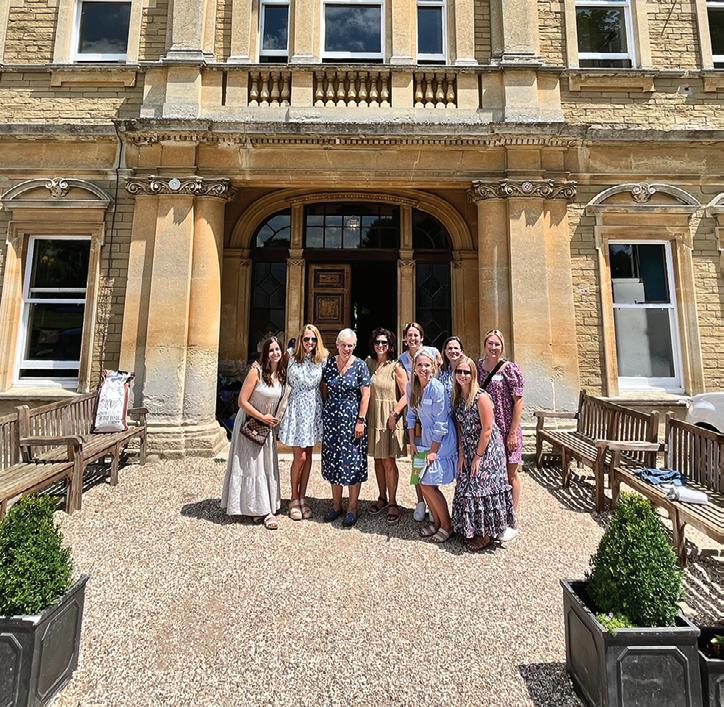

Important personal keepsakes were brought to the archive room for safekeeping.
Abbie: Since Sir John worked so closely with the Queen and her family, he received many letters and Christmas cards from different royals for several years. We found many of these artifacts while doing our archiving. Not many people can say that they have held personal letters and Christmas cards signed by Queen Elizabeth II, King Charles, Princess Diana, the Queen Mother, and more. This was a highlight of our visit.
Julianne: Once the treasures were moved to the new archive room, that left the stacks and stacks of books, many water damaged or falling apart, ready to be moved and inspected. Our determined, industrious team carried the whole library out of the basement and into the “arcade” (a covered patio) to the tunes of a country soundtrack. We found books dating back hundreds of years, including everything from A Butler’s Recipe Book from 1719 to a first edition of Master Humphrey’s Clock by Charles Dickens.
Rebecca: The moments after the vacuum cleaner went off for the final time and the last box of archived material went up to that room, we felt a sense of pride. We had done it! It was clear! The room was walkable, organized, and useable. Mission accomplished.
We were observers and learners and became implementers
Rebecca: Inspired by a student who had been diagnosed with dyscalculia, and discovering what little I knew about it, I decided to make observations at specialty schools in the UK part of our grant proposal. Trinity has done an excellent job focusing on learning differences among our young students, especially in literacy, and my colleagues and I feel that that there is an opportunity to offer similar support to students who struggle with numeracy. After ordering the book The Dyscalculia Assessment, I researched its background and authors only to discover that one of the authors co-founded a teaching center in London for children with special educational needs in literacy and mathematics. I could not wait to contact them!
Hilary: One of the main reasons we applied for a grant to go to England was so that we could plan a visit to the Emerson House to learn more about their work with students who struggle with dyscalculia, along with the assessments they use to plan their instruction. After researching a bit and having a call with the Head over at Emerson House, we learned that Emerson House is a before- and after-school tutoring facility that helps students with special education needs. They’re a small establishment and didn’t have the capacity to host eight of us, as they often tutor kids around a small table. They were so helpful to us, however, as they recommended a few schools for us to contact that
44 Features
A hand-signed Christmas card from the former Prince and Princess of Wales.
First-Grade teachers immediately implemented the use of a green screen at the beginning of the school year.
Members of the team pose with Bruern Abbey’s director of admissions after a day of observations and a guided tour.

specialize in teaching students with learning differences. This was how we connected with Bruern Abbey.
Rebecca: Bruern Abbey is an elementary boarding school in Bicester-Chesterton for boys with dyslexia, dyscalculia, and dyspraxia. It was only a 25-minute drive from Shotover. On the morning of our visit, Deborah Swift, Bruern’s director of admissions, awaited us outside the school. It looked like an old estate with playfields to the right. After signing in, we were led outside to a patio surrounded by enormous, blossoming roses that overlooked more fields and small buildings. Deborah led us to the buildings containing geography and drama classes, followed by the sports courts and chicken coops. She said that the “Chicken Club” was trendy among the boys. They sell the eggs produced by them at the entrance to the school.
A math teacher named Rachel met us back on the patio. She showed us the Numicon tool, which we had not used in First Grade. She described her approach to teaching math to children with dyscalculia: constant repetition, a multisensory approach, matching answers instead of making them show their work, games, movement breaks, and more. We also learned about Puma Papers, their End-of-FirstGrade assessment, which features multiplication, division, fractions, and more.
Hilary: Our Trinity group was divided up, and a few of us had the opportunity to meet with MJ, Bruern’s head of maths. She shared the structure of their lessons, which are mainly student driven, along with tools and assessments that they use to support students. One tool that we were wowed by was Numicon. She shared that it is a multisensory approach to teaching math that helps students to see connections between numbers. Students work at their own pace and discuss and share with one another often each day.
Rebecca: MJ had been teaching math all over the world for 32 years, so she had extensive knowledge and experience in working with young mathematicians. We were surprised to find out that using a green background on the ClearTouch background is easier on the eyes of young learners. This is a tool we implemented immediately when starting this school year. She also introduced us to new strategies in building number sense, such as “dot numbers,” and reiterated strategies we already have in place, such as breaking down lessons piece by piece.
Margaret: With our opportunity to observe a small math classroom setting, the significance of interactive materials on learning, particularly with abstract mathematical concepts, became very obvious to us. Also, the quick pace of the class kept the students engaged yet allowed for general introduction/discussion by the teacher in a facilitator role, partner material exploration, and independent recording for accountability and understanding. The students were clear on routines and processes that had been implemented,
which worked well for the effort put forth and questions that were comfortably asked along the way. These observations have encouraged us to reflect on the pace of our specific math lessons and how the mini-lesson is particularly effective when student engagement and material interaction make up most of the math block. We have since adjusted the sequence and pace of our math lessons accordingly. Results are happening!
Rebecca: We ended our visit with a walk through Bruern Abbey’s version of Discovery Woods. With a babbling brook running through it, students are encouraged to play, imagine, and explore the area, which includes an elevated play structure. It was a memorable, valuable visit to such a special school. We extended an open invitation to them in hopes they would visit our own magical school.
We were tourists embracing team building
Rebecca: Just a short double decker bus ride from Shotover was the incredibly cultural city of Oxford, and it was there we began the tourist part of our journey.
Melissa: Visiting Oxford was such a unique part of the trip! From exploring the quaint Covered Market and local shops to admiring the beautiful architecture while punting on the Cherwell, which leads to the River Thames, the charm and history of this city left a lasting mark on us.
Margaret: We embarked from the Magdalen Bridge Boathouse on a relaxing glide down the river Cherwell in a long wooden boat with a punter leading the way through a winding view of many College Backs belonging to Oxford University. What a majestic sight to see the solid stone structures of the oldest university in the Englishspeaking world, founded in 1096 to be exact! We learned Oxford University is composed of more than 30 different colleges, which are like smaller academic communities, each providing a more personalized experience within the overarching university.
Melissa: After a productive, incomparable four days, our team left for London. Coming from a very old yet gorgeous estate, we were ecstatic to have modern amenities, such as AC and showers, waiting for us in our Pembroke Mews flat. Nestled in the gorgeous borough of Chelsea and Kensington, our location left us within walking distance of so many landmarks, parks, and restaurants.
Bella: London was packed with sightseeing, and our team building there included eating our way through the city, discovering new areas, and accumulating tens of thousands of steps each day. Some of the highlights were walking through Hyde Park, searching high and low for the best sandwich at The Black Pig in Borough Market, and, of course, witnessing firsthand the changing of the guard at Buckingham Palace.
45

Melissa: Can you go to London without experiencing one of their “high teas”? Visiting the iconic Claridge’s was a fantastic team-building experience unlike any other. Spoiled by the elegant atmosphere, blue and white striped china, and wide variety of teas, we loved dressing up to enjoy an afternoon filled with delicious teas and a traditional combination of sweet and savory foods.
Bella: Richmond is a must-see for anyone who loves the show Ted Lasso. We got to visit several actual filming locations, such as Ted’s local pub The Crown and the Anchor, where we ate lunch, and we even got to stand next to and see Ted’s front door just a short walk away from the pub. Once we finished our self-guided Ted Lasso tour, we took a stroll alongside the River Thames and throughout the town, and we ended our day with a delicious dinner at The White Swan.
Hilary: The day we visited Richmond, we racked up approximately 20,000 steps. A few of my favorite steps were taken while we roamed through Richmond Park on a mission to find a gate with the words “The Way” twisted on it in wrought iron. We weren’t quite sure where it was located exactly, but we enjoyed the fresh air, conversation, and countless laughs until, eventually, we happened upon our destination. With all of the walking that we did in Richmond, we decided to stop and literally smell the roses in a hillside garden overlooking the Thames. It was a picturesque 30 minutes or so during which we all took a mindful moment and enjoyed the beauty of this quaint town.
We left as family
Annie: When I joined the First-Grade team in the middle of the summer of 2022, I had no idea that I was in for the trip of a lifetime that next summer! They immediately made me feel so welcomed and included, and I was so excited that I was able to join them on this trip. We spent countless hours researching, discussing, and planning. The trip only made us closer, and I am so grateful that I got to experience it with these amazing women!
Bella: Applying for our grant and planning our trip together was only the beginning of all the team building and bonding we would be doing throughout our journey together. Once we arrived in England, we spent our days either archiving, visiting a school, or sightseeing, and after that was done, we wrapped up our nights with a delicious meal and a fun game or two.
Alex and Camilla: In the summer of 2023, the answer to our prayers arrived in the form of Rebecca and her team of archiving angels from Atlanta. Tirelessly, they labored for days on end trying to make sense of the chaos they faced. But the result was truly amazing and now, thanks to them, Shotover has an archive! There remains plenty of work to do but the archive is up and running and the Old Estate Office is now a picture of organization (and post-it notes!). The
readers of Horse and Hound will be absolutely delighted! Rebecca and her team were a delight to host, ever helpful and gracious, full of energy and fun in the face of a daunting task. We love “y’all.” Thank you and please come back, there’s still work to do.
Hilary: Pulling away from Shotover left me feeling extremely fortunate because I never imagined that I’d be invited to stay at such an amazing place with such wonderful people. Getting to participate in some “voluntourism” that yielded unique artifacts, helped a deserving family, and created an even stronger bond with my team—something I didn’t think was possible—was priceless.
Rebecca: And so it ended. We arrived feeling eager to take on the challenge of archiving, excited to observe and learn from fellow educators, and ready to bond as a team in a different country. We left feeling fulfilled, accomplished, closer than we could have ever imagined, and most of all grateful for this unbelievable opportunity bestowed on each of us from the Trinity community.


Features
Bella, Rebecca, Annie, and Abbie punt down the Cherwell.
46
Annie, Bella, Caroline, Melissa, and Hilary pose outside a gate in Richmond Park.

Staff Story: Carli Reis
By Nicole Fash, Director of Marketing and Communications
Licensed psychologist and Trinity School parent Carli Reis, PhD, divides her time between seeing patients at her private practice and serving as Trinity’s consulting psychologist. Carli brings a wide array of experiences and a strong commitment to her roles as a parent, professional, and community member, and her upbringing, education, and career reflect a deep desire to understand, support, and nurture the development of children.
Born and raised in Denver, Colorado, Carli’s childhood was shaped by a love of sports, outdoor activities, and a tight-knit family. The middle child in a family of five, with
an older sister and a younger brother, she experienced the joys of growing up in a supportive environment. Her father, a small business owner, and her mother, initially a stay-athome parent who later became a special education teacher, played pivotal roles in fostering Carli’s values and interests.
After high school, Carli attended Washington and Lee University in Virginia. Although it was a big cultural shift going from Colorado to a small, private college in the South, Carli really enjoyed her experience at W&L. Graduating with a Bachelor of Arts in Psychology and Sociology/ Anthropology, Carli's passion for understanding the
48 Features
Carli Reis shares a laugh with Ms. P and Mr. Cheese.
students, allowing Carli to focus on providing support and guidance at a broader level. This can include recommending resources beyond the school environment, enhancing the support network accessible to both students and parents. Carli’s presence on campus ensures that her expertise is available to the Trinity community, contributing to the School’s holistic approach to child development and well-being.
“I am at Trinity on a part-time basis, a couple of mornings a week,” she says. “Ms. P and Mr. Cheese are at the school full time to proactively help with social-emotional learning and development in the classroom, to help facilitate groups or individual sessions if needed, and to help with any emotional or behavioral issues that arise. They are both wonderful at the job, and I love getting to work closely with them.”
Carli became even more connected to Trinity when she and Steve’s oldest daughter, Tillie, entered the Early Learners program in 2018. Two years later, Tillie was joined by her little sister, Wallace.
“One of the most special things that I have witnessed at Trinity is that children are both known and valued,” says Carli. “When children walk through the doors each morning, they are greeted by name by numerous members of the staff, not just their own teachers. Students don’t have to attend class with someone or achieve something to be recognized. Instead, they are constantly shown that they have value just for being themselves and for being a part of the community.”
“Trinity has an amazing body of teachers and staff who share the belief in the importance of cherishing childhood,” she continues. “After getting to witness the incredible childcentered approach through admissions and then getting to be a part of the wonderful faculty and staff as the consulting psychologist, it was a no-brainer that I wanted my own children to get to be a part of this special community.”
Carli recognizes the potential challenges of balancing her professional role with her children’s education and adheres to a strict code of confidentiality.
“I know that at times it can make things awkward if I am involved in helping a family find the right resources or next steps for their child when they might also know my own children, but I use the same standards of confidentiality I would in my practice even though I am not providing direct psychological care at Trinity,” she says.
Continuing her professional growth, in 2019 Carli founded the group practice Peachtree Integrated Psychology with four other psychologists. They are independent
practitioners who share an office and have individual specialties, most of which center around children and families. Carli focuses on parenting consultations, family therapy, and psychoeducational evaluations as well as individual therapy for children, adolescents, and adults.
In addition to growing her practice, she continued her association with Emory’s School of Medicine off and on for close to a decade as an adjunct associate professor, supervising her final Child Psychiatry Fellow during the pandemic.
Carli’s commitment to helping others extends beyond her roles as consulting psychologist and private practitioner. She has led multiple parent education events at Trinity and presented at other independent schools and medical organizations in Atlanta. She is involved in various community initiatives and enjoys hosting events for various causes at her home. Carli was most recently a co-chair of this year’s High Museum Atlanta Wine Auction with Cathy Rhodes, parent of three Trinity alums. This event is the High’s largest annual fundraiser, which supports arts education outreach programs and provides a meaningful contribution to the organization’s operating budget. Additionally, she supported the 2024 Cathedral Giving By Design event in January and serves on the Mental Health Committee for Odyssey Atlanta and the PaulUnited Committee, a group that focuses on fundraising for targeted pediatric cancer treatments.
“I’m enormously grateful for all of the help and encouragement I’ve received in my life, and I try to do what I can to support others who might not have had similar opportunities,” says Carli. “I am not always great at initiating things, but I am quick to say ‘yes’ if there’s something I can do to help.”
In her spare time, Carli enjoys cooking, reading, listening to music, attending concerts, traveling, playing Mahjong, and, above all, being with her family. Every summer, she, Steve, Tillie, and Wallace look forward to visiting family in Colorado and spending as much time as possible outdoors.
When asked what the future holds for her, Carli says that maybe someday she will discover how to balance all her priorities. In the meantime, she gives her all to being a parent, wife, psychologist, and consultant and is grateful to be at Trinity.
“This is such a special place that seems to afford kids the chance to hang on to childhood a little bit longer,” she says.
“I love my role at Trinity and feel so grateful to get to work here and collaborate with wonderful colleagues who have the same goal – to help kids reach their potential.”
50 Features
Fun Facts About Carli Reis
Favorite foods: Hard to beat a good meal at Superica
Cannot survive without: Coffee
Favorite show: Arrested Development
Favorite movie: The 1993 version of Much Ado About Nothing
Favorite books: Pride and Prejudice personally; The Deepest Well, Teach Your Children Well, and Raising Human Beings professionally
Favorite school subjects: Math and AP Art History
Favorite children’s book: The Jolly Postman
Favorite Flik food: The homemade potato chips
Superpower: Recognizing songs and artists quickly, à la “Name That Tune”

51

52 Features
An Evening at Neiman Marcus
A look back at this year’s Spotlight on Art
By Leisy Stevenson, Director of Spotlight on Art and Special Events
Now in its 42nd year, Spotlight on Art is an incomparable series of art events that not only serves as a critical fundraiser for Trinity School but also plays a vital role in building connections within our parent body and with the greater Atlanta community.
Thank You, Volunteers
More than 100 dedicated volunteers help make Spotlight on Art a resounding success every year, and Trinity is
deeply appreciative of each one. A special thank you to this year’s Spotlight leadership team, pictured below from left to right: Artists Market Co-Chair and ChairElect Alice Brown, Chair Emily Mills, Auction Co-Chairs Julie Jones and Catherine Humann Callaway ’97, and Artists Market Co-Chairs Dorsey Bryan and Kara Guidry. These individuals devoted countless hours to planning, organizing, and executing Spotlight’s series of events that benefit Trinity in multiple ways. Thank you for making this school year’s Spotlight on Art season so special!


53
A large number of the Artists Market volunteers gather for a group photo.
The 2024 Spotlight on Art leadership team is all smiles at the Gala.
Pop-Up Gallery at Neiman Marcus
We kicked off this year’s Spotlight on Art season with our annual Pop-Up Gallery at Neiman Marcus, which was held from September 23 to October 22, 2023. The event included thoughtfully curated artwork from five preeminent artists: Nikki Commander, Olivia Fields, Elaine Jackson, Kate Roebuck, and Maggie Thomason. All work was available for purchase.
An Evening at Neiman Marcus
On Wednesday, September 27, 2023, a group of Trinity parents enjoyed An Evening at Neiman Marcus. This sold-out event featured a fall fashion trends presentation and runway show by Rebecca Brodnan, public relations manager of Neiman Marcus, as well as shopping, light bites, and bubbly.
Pop-Up Shop at Trinity School
The Spotlight on Art Pop-Up Shop took place during conferences on November 6 and 7, 2023. The two-day event featured artwork, jewelry, and items for the home. It was the perfect opportunity to shop for loved ones for the holidays. We also hosted our second annual Sip ‘n Shop on Monday, November 6, which was open to the public. Guests enjoyed a signature cocktail, wine, and charcuterie bites while browsing items in a relaxed environment.
Artists Market
For the third consecutive year, the Artists Market had a record-breaking sales total! The Allison Williams Activity Center (AWAC) was once again transformed into a

6,000-square-foot gallery space. The Market featured the work of more than 300 artists and sections ranged from realism to jewelry, contemporary to items for the home. The event was held January 29–February 3 and included two evening events: the Opening Night Celebration on January 29 and Cocktails and Canvases on February 2. This year’s Artists Market sold more than $1.4 million worth of artwork in six days.
Gala and Auction
To cap off the Spotlight season, we held our annual Gala and Auction for the Trinity community on February 24. Fourhundred parents, faculty, staff, and special guests enjoyed an evening to remember at the Atlanta History Center. This sold-out event included a seated dinner catered by Bold Catering and Design, cocktails, a silent and live auction, and live music by the band Shimmer.
2024 Nonprofit Beneficiary: Children’s Museum of Atlanta
Continuing Spotlight’s service-learning tradition, the Trinity Sixth Grade Leadership Class selected the Children’s Museum of Atlanta as the nonprofit recipient of this year’s charitable contribution from Spotlight on Art. Moreover, the Sixth Graders volunteered at the Museum, working closely with the education team. Interacting with children ages 2–8, the Sixth Graders assisted with design challenges, science experiments, and art projects.
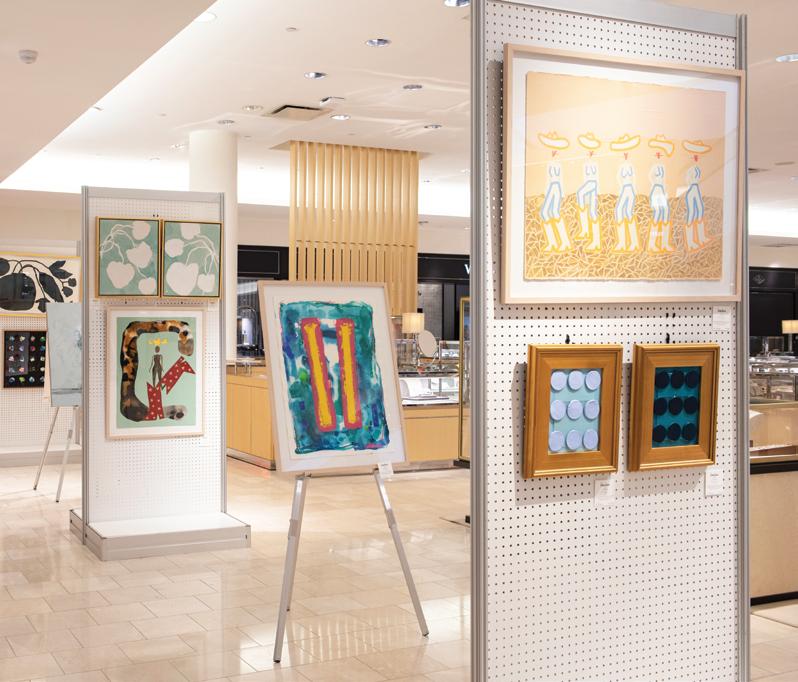
54
Features
Pop-Up Gallery at Neiman Marcus
Gala and Auction



55
Artists Market
Pop-Up Shop at Trinity
Sixth Grade Spotlight on Art Service Project
Alumni

56
A glimpse of The Lodge, a newly renovated two-and-a-half bedroom log cabin on the Grateful Woods property.

area and knew we wanted to invest in a second home there.”
Fast forward a few months and Casey and Marc are engaged and looking for venues. They had an exact vision of what they were looking for, which was a venue upstate where the future Endes could both stay and celebrate their union. The question was, where exactly was that venue? The couple visited venues near and far that Casey had found on Instagram, but nothing was quite what they had envisioned. Simultaneously, they had begun their hunt for an upstate home for themselves.
“We were in the area, so we figured why not? Somewhere along the way, we realized how much a wedding was going to cost and how much the deposit on the property of our dreams would be and decided to pivot,” she says.
In March 2019, Casey and Marc purchased a run-down old horse farm that sat on 75 acres that had multiple units, broken water features, and only one space that was really “habitable.” They lived in that space on an air mattress for about four months while converting the original horse barn into bedrooms and beginning renovations on one of the other units.
Casey says, “We put up a couple of glamping (glamorous camping) tents so we could sleep a few more people, moved into one of the other units, quickly gutted the bathroom, slapped some paint and new floors onto the space we had been inhabiting, and put ‘er up on Airbnb!”
For the next six months, Casey and Marc rented out the converted barn and some glamping tents to groups of eight to 12 people.
Renovations on the property continued and the couple started bringing the land back to life. Like many of us, COVID-19 threw a wrench in their plans. Just as they had begun reviving
58
Alumni
A path takes you to the heated saltwater pool that was once a Koi pond.
the swimming pool that had been used as a Koi pond for the last 30 years, their work came to a halt. All of their upcoming summer reservations wanted to cancel, and the couple felt they had no choice but to offer refunds. Through these obstacles and more, Casey and Marc learned to exercise flexibility and harnessed a dedication to seeing their dream come to life.
“Marc and I did all of the design and most of the renovation work on our own,” says Casey. “This was definitely challenging on our relationship at times, but ultimately, we learned and grew together in the best way. Since we phased out a lot of the renovations, each unit or project was a chance to learn from our mistakes, start fresh, and implement new ways of managing our time and working together.”
When asked to describe Grateful Woods and what makes it a unique experience, Casey says, “Grateful Woods is a 75-acre nature retreat, set on equal parts farmland and forest, in the heart of the Hudson Valley in New York. Depending on the season, we can sleep up to 42 people, all in actual beds, between multiple units, including a log cabin, converted horse barn, cottage, farmhouse, converted school bus, and glamping tents. Aside from the unique layout and design of the sleeping arrangements, we offer a plethora of amenities such as a pool, hot tub, outdoor shower, creek, waterfall, swimming hole, fishing and boating pond, lawn games, board games, trails, animals, and much more. We like to think of Grateful Woods as more of your own private hotel than an Airbnb since we offer so much more than just a rental home. Whether you want to curate a special dinner, weekend of events, wellness week or more, we’re here to help you along the way.”
Casey and Marc became first-time parents when their son, Crosby, arrived on February 7, 2023.
“Crosby’s arrival could not have come at a more perfect time,” Casey says. “Our business was in a great place for me to step back and focus on family and raising our little boy for a while. I cannot stress the importance of timing enough. There is a time and a place for everything.”
As for the future, Casey says she and Marc are taking a careful, strategic approach.
“We would love to have a few more properties as unique as Grateful Woods, but we want to make sure we do it right so finding our next project has taken a little longer than we’d hoped,” she says. “Whatever’s next for us will happen, and whatever it is, we are sure it will be amazing.”
Casey says that although her usual hobbies look a little different than they used to, the joy of being a parent and watching her son grow has been an incredible experience.
“I hate to admit that I haven’t left myself much time for hobbies in the last year, but I also don’t regret that. I have a hard time managing multiple different things at once, so when I’m working on something I really intend to focus on it. Babies grow up quickly and the ability to give Crosby 100 percent through this first year was really important to me. Normally, I enjoy live music, traveling, and gardening when I can, but I wouldn’t trade any of that for the time Crosby and I have spent together over this past year. I know that won’t always be possible, so I’ve truly cherished every moment.”
Casey remembers her days as a Trinity student fondly and treasures the relationships she made throughout elementary school. Although life has taken the Class of 2003 all over the world, the bonds they made through cherished Trinity traditions such as The Nutcracker, Field Day, and even Pero’s Pizza on Fridays, will never fade. The Trinity community remains
committed to nurturing its students and fostering the genuine friendships made here; friendships that are built to last a lifetime.
Casey believes she grew up more in elementary school than any other single time in her life. Trinity’s core values of cherishing childhood and empowering students in their learning serve as hallmarks for Casey’s time as a Trinity student.
“Ms. Em’s free-natured spirit and the energy and spunk Ms. Mo brought into the classroom everyday definitely had major impacts on me and the person I wanted to become. These experiences, friendships, and the well-rounded curriculum and support we were offered at Trinity, built the foundation for the person I wanted to become.”
In closing, we asked Casey what advice she would give to fellow alumni and our young graduates, some of whom might even be considering a similar path of entrepreneurship or property management.
She says, “Go for it! If you can dream it, you can do it. Don’t overthink it. Just get started and see where the journey takes you. Focus on the journey, not the outcome. If you love what you do, and who you do it with, success will come. You might not end up with the product you set out to make, but that’s what makes it fun!”
On behalf of the Trinity School Alumni Association, I wish Casey and her family continued success with Grateful Woods and their future endeavors. We look forward to watching their next adventure unfold!
59
Alumni Night at Trinity School
This school year, our annual Alumni Night, for all Trinity alums 21 years and older, was held in conjunction with Spotlight On Art’s Holiday Sip ‘n Shop on November 6, 2023. Alums enjoyed visiting with long-time friends as well as getting a sneak preview of some of the artists that were showcased during the Spotlight On Art Artists Market.

61
Hall McKinley IV ’00 (pictured with his wife, Sarah), Allison McKinley Schmitz ’97, and Mark Kaufman Jr. ’98 enjoy looking back at yearbooks and reminiscing on their memories as Trinity students.
Find @trinityschoolalums on Instagram to keep up with alumni news, events, and more!
Visit www.trinityatl.org/alumni to submit Class Notes and update your contact information.
1

Class Notes
Compiled by Anne Torrey McCuean ’08, Advancement Associate and Alumni Relations
1
John Symbas ’90 and his wife, Anne Symbas, welcomed their second child, George Nikolas Symbas on September 25, 2023. George joined proud big brother Peter.
2
Mark Bollman ’00 and his wife, Alyssa Bollman, welcomed Isabel Rae Bollman on February 10, 2023.
3
Margaux Black Gray ’00 and her husband, Tommy Gray, moved back to Atlanta in June and are thrilled to be home. Their daughter, Ella, started Pre-K at Trinity in the fall, and their son, Teddy, is two years old. Margaux is a pediatrician, living her childhood dream.
4
Kathryn Boyd Crabtree ’02 and her husband, Bill Crabtree, welcomed James Gray Crabtree on September 21, 2023. James joined proud big brother Boyd.
5
Jack Mitchell ’02 and his wife, Annie Mitchell, welcomed Poppy Avery Mitchell on September 4, 2023. Poppy joined proud big brother Mac.
6
McCrea O’Haire Stern ’02 and her husband, Jason Stern, welcomed Jay “JJ” O’Haire Stern on April 17, 2023.
62
Alumni

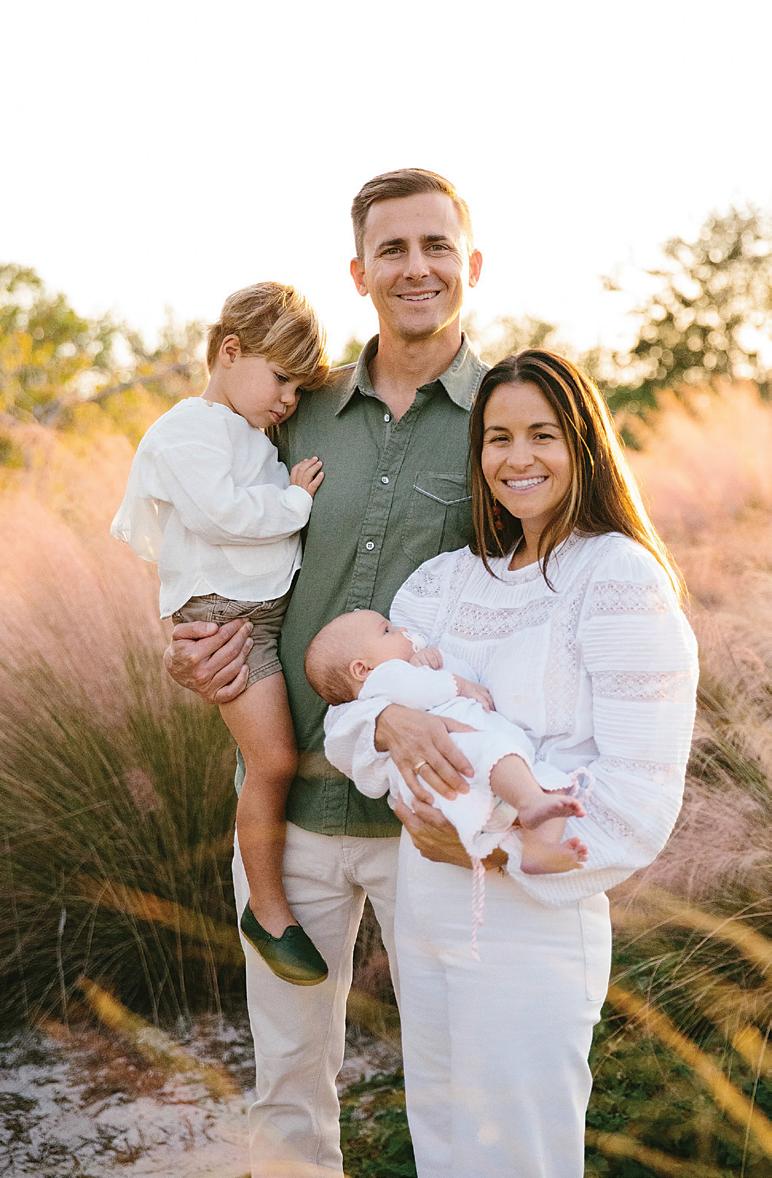



63 2 3 4 5 6
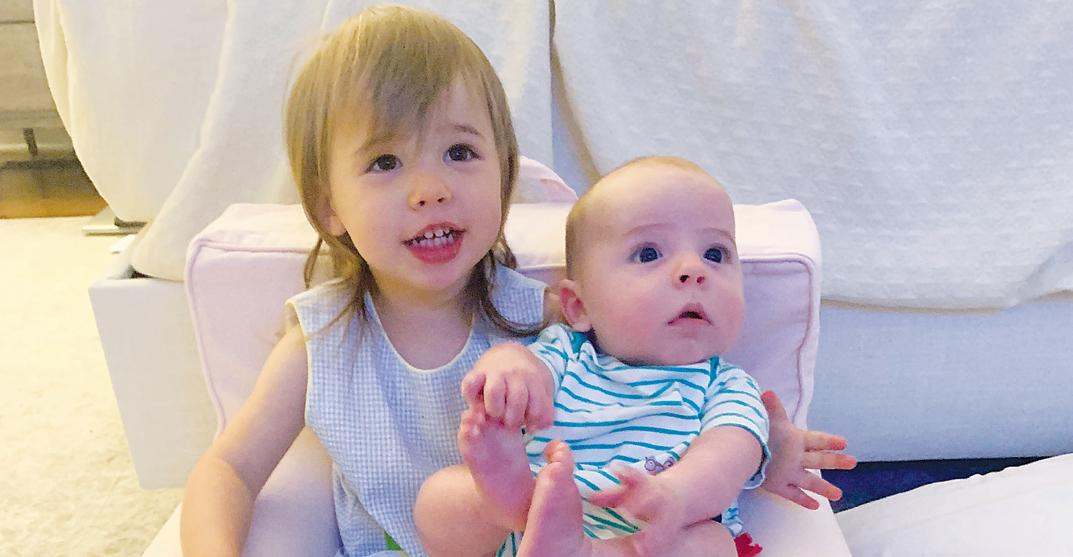

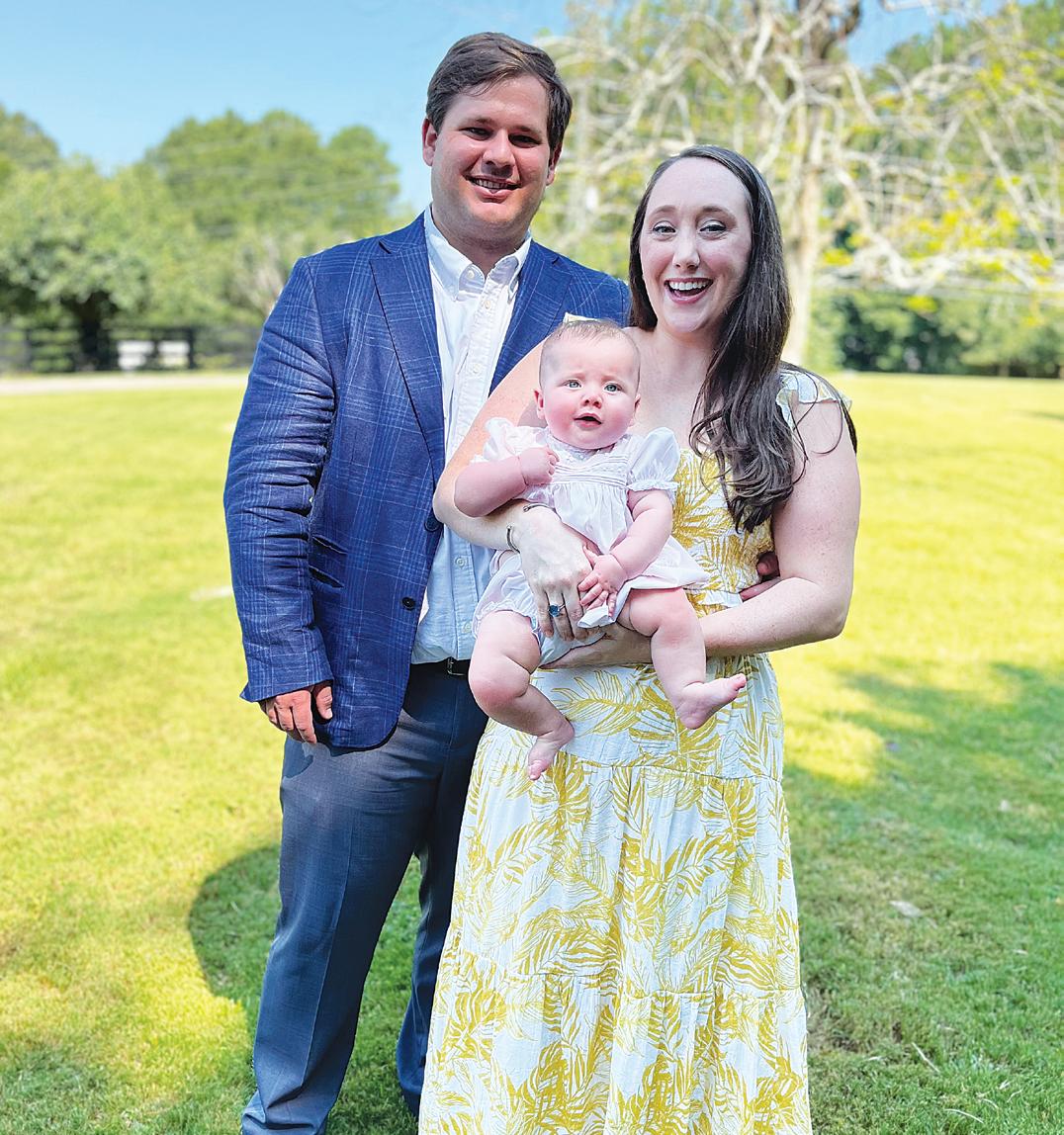


10 11 8 7 64 12
Alumni

9
Visit www.trinityatl.org/alumni to submit Class Notes and update your contact information.
7
Kelly York Hays ’03 and her husband, Lowell Hays, welcomed William “Houston” Hays on February 24, 2023. Houston joined proud big sister Harper.
8
Caroline McKinley ’03 married Patrick Goodman on November 11, 2023, in Atlanta. Trinity alums Allison McKinley Schmitz ’97 and Jenny NeSmith Pancoast ’03 were matrons of honor, and Caroline’s brother Hall McKinley IV ’00 was a groomsman.
9
Jenny NeSmith Pancoast ’03 has leveraged her career in fashion, marketing, and customer experience to launch Jenny Pancoast Styling, providing wardrobe consulting services to clients and editorial partners in Atlanta and across the Southeast. Jenny collaborates with clients in person and virtually to define and express their personal brands through a carefully curated wardrobe and styled looks for events, appearances, and daily wear.
10
Ashley Hester Pierson ’03 and her husband, Rob Pierson, welcomed Robert “Beau” Franklin Pierson III on January 25, 2023.
11
Carter McClaugherty ’04 and his wife, Sarah McClaugherty, welcomed Sutton Katherine McClaugherty on April 7, 2023.
12
Jonathan York ’04 and his wife, Kelsey York, welcomed their second child, Marguerite McIver York, on November 25, 2022. Marguerite joined proud big sister Ellie Alexandra. The Yorks currently live in Annandale, New Jersey, where they are pursuing small business ventures and enjoying their growing family.
65





67 14 15 16 17 18
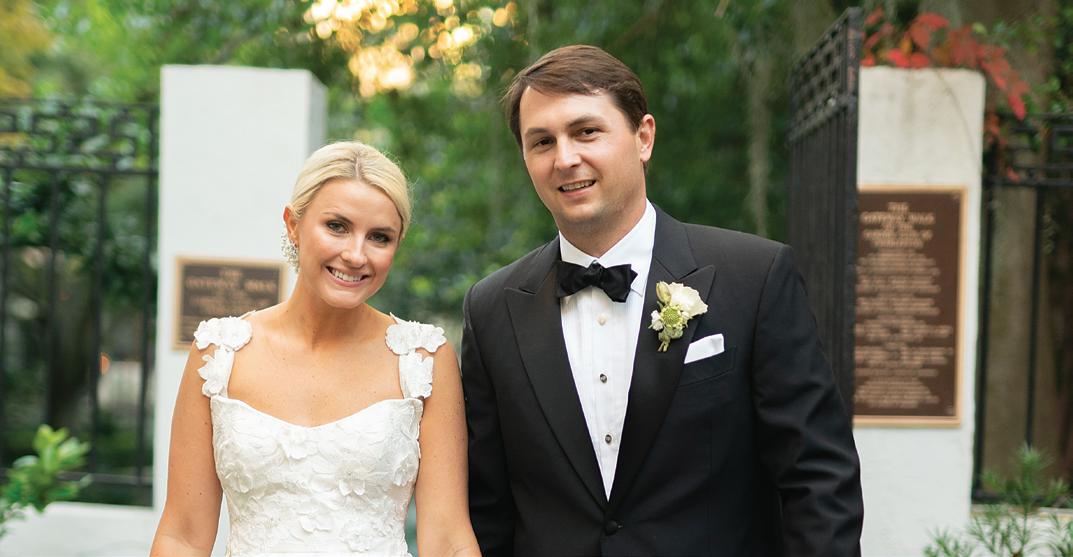




22 23 20 19 24 Alumni 68 Graphic by Adekale Ande Graphic by Adekale Ande
100% faculty and staff participation for 29 years
100% Trustee participation

98% parent participation last year
594 students are impacted by The Trinity Fund
100% of your gift is tax deductible
You fund
possibilities
The Trinity Fund is the foundation of philanthropic support for our students and everything they experience at our school. Gifts to this annual giving initiative are used to address immediate needs, such as curricular enhancements, classroom improvements, faculty salaries, technology, and need-based financial
assistance. With your support, The Trinity Fund gives us the necessary resources to elevate the Trinity Experience from a great one to an exceptional one.
Help us close out the school year strong!
Make your gift online today at trinityatl.org/give
4301 Northside Parkway NW Atlanta, Georgia 30327 Non-Profit Org. US Postage PAID Permit #2905 Atlanta, GA




 Joseph P. Marshall Head of School
Joseph P. Marshall Head of School





































































































